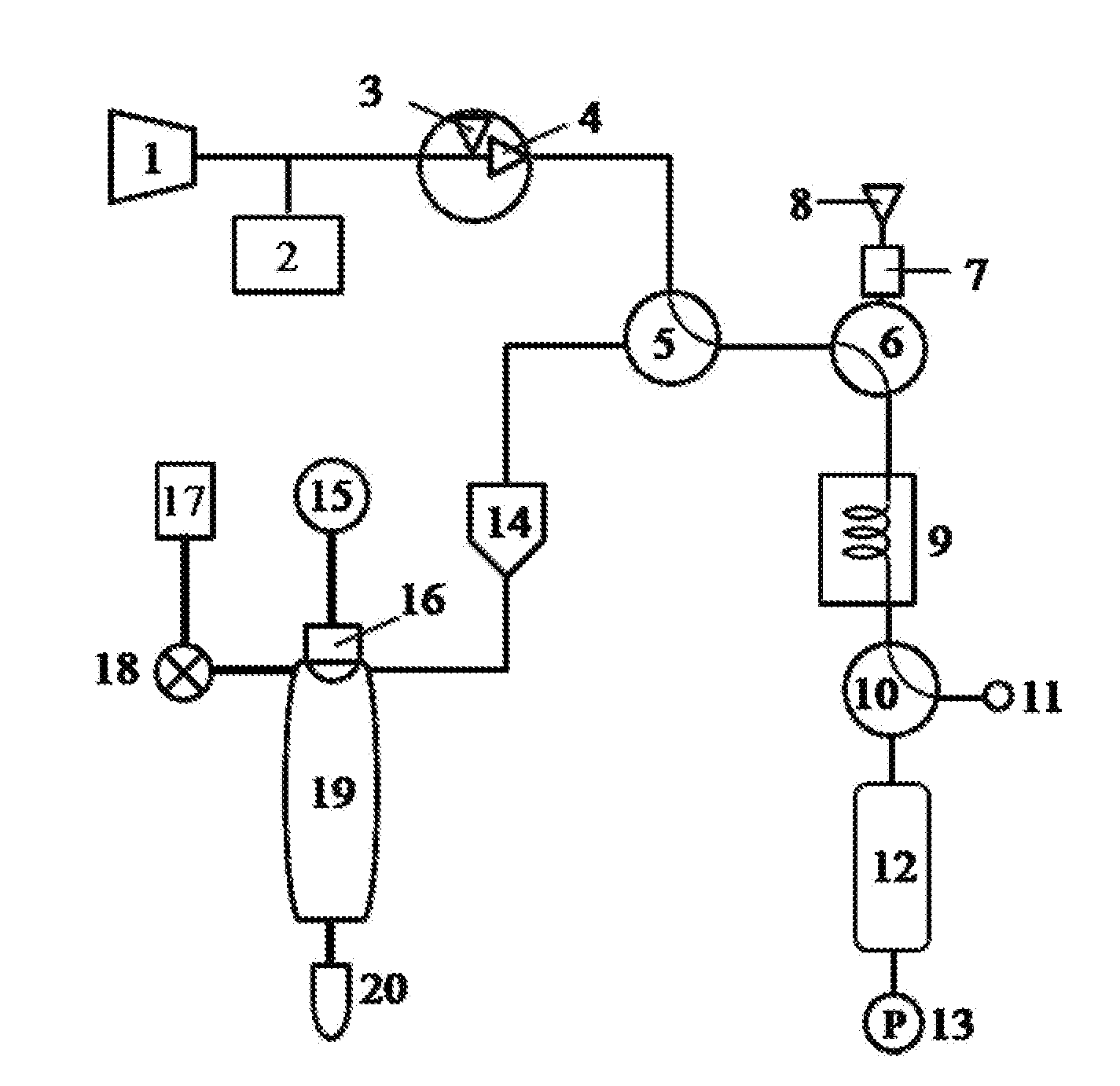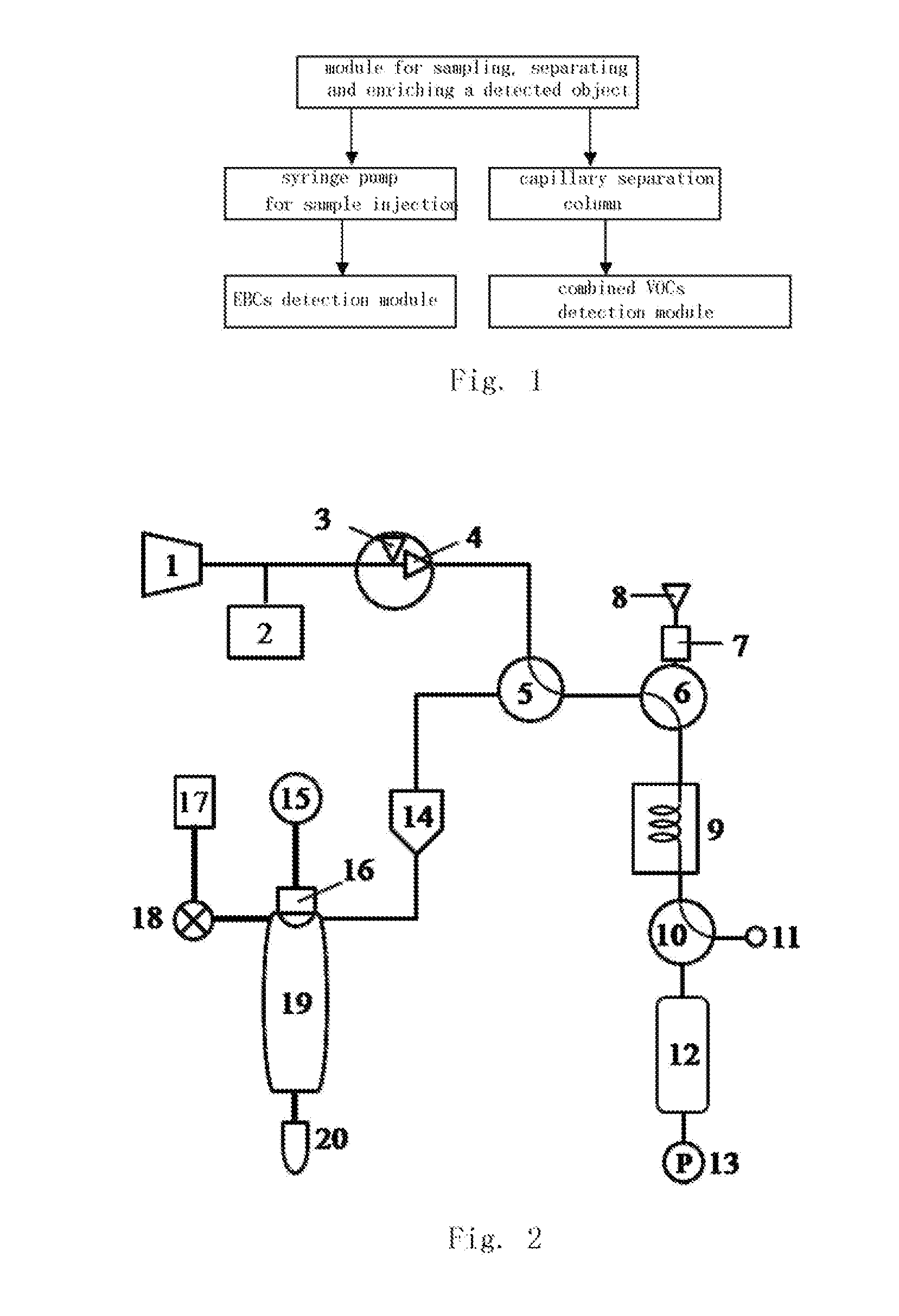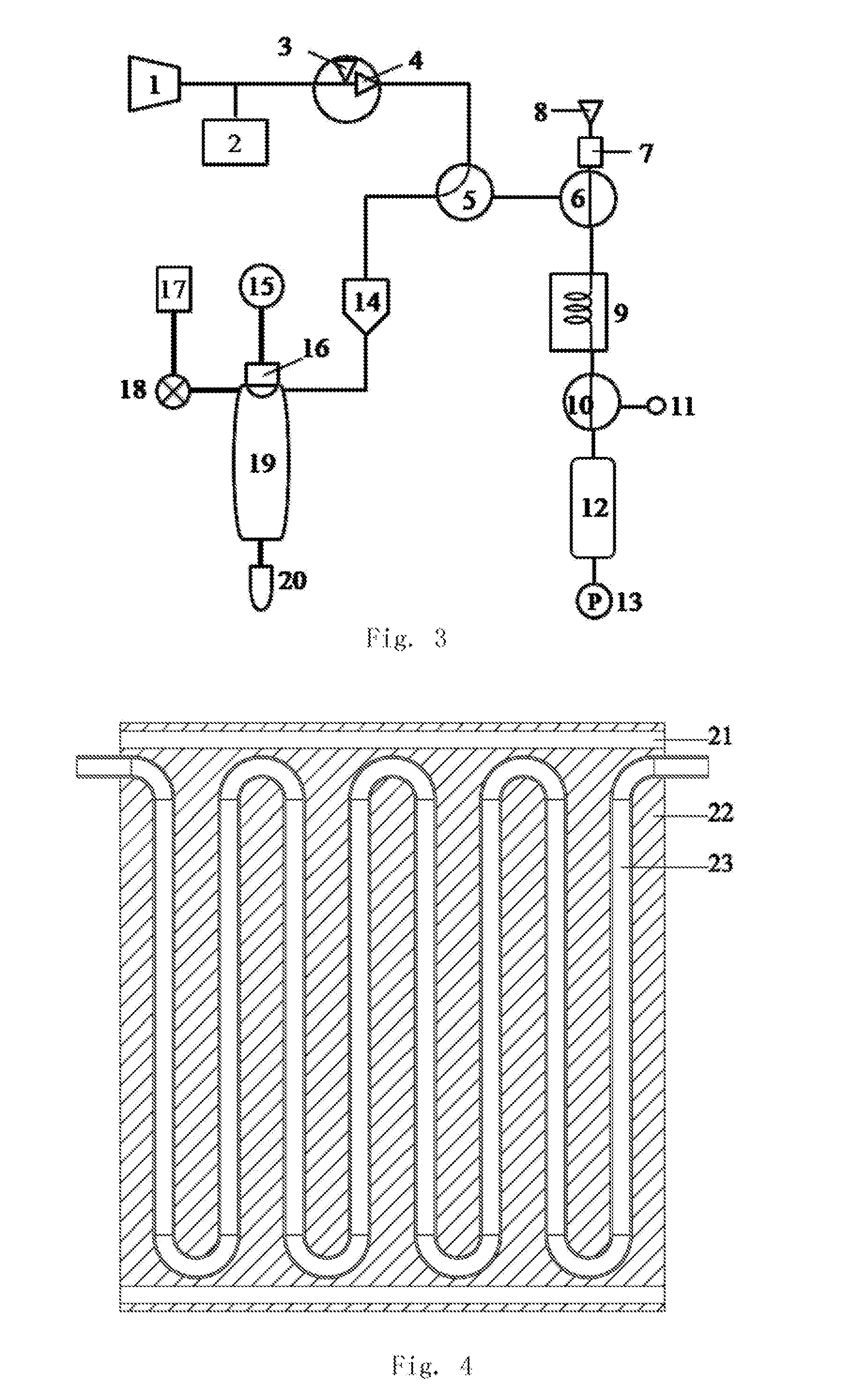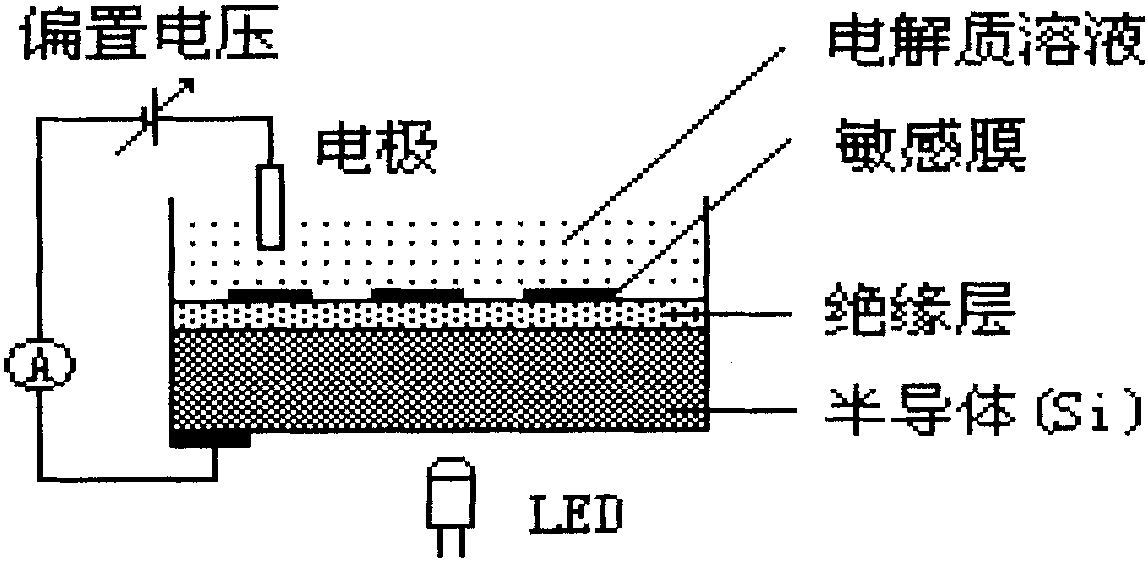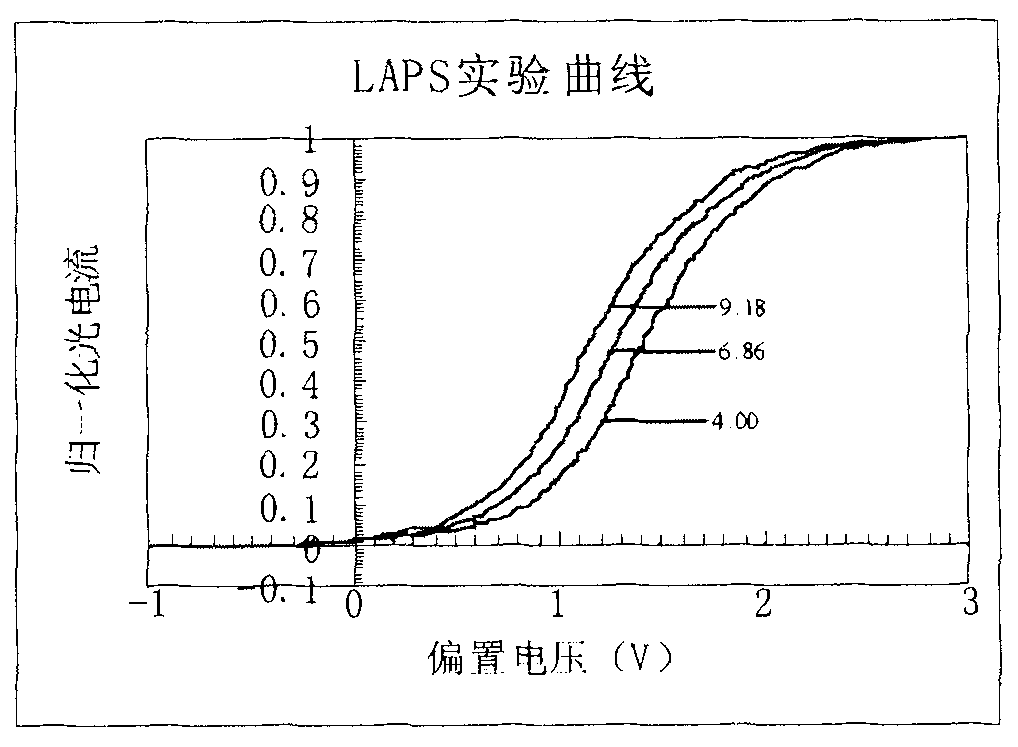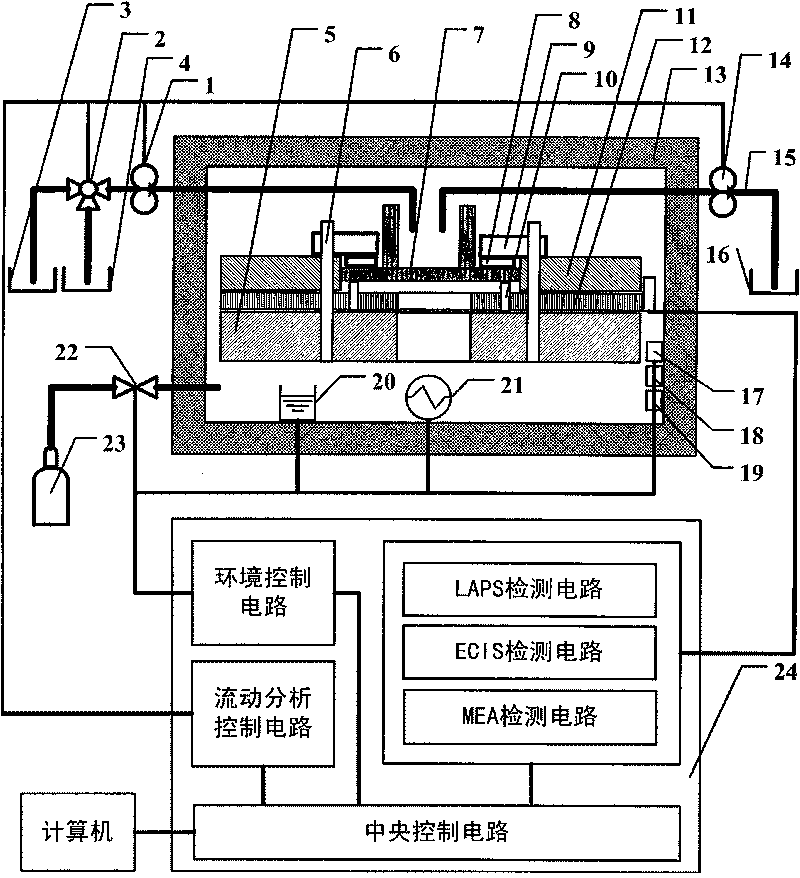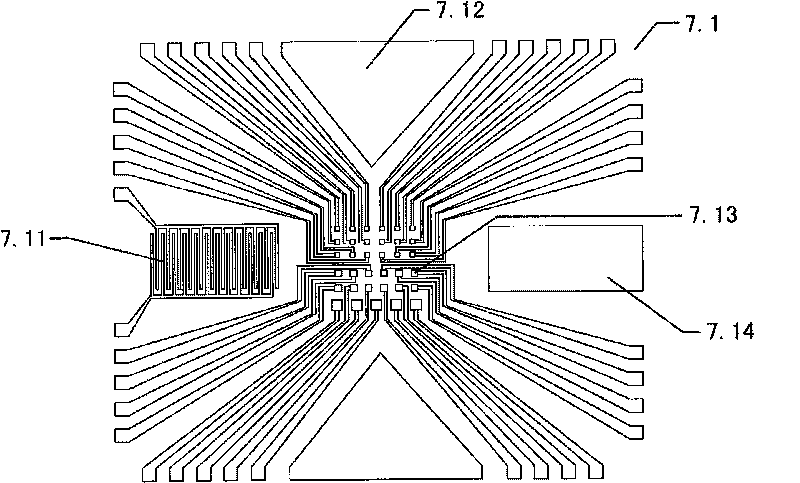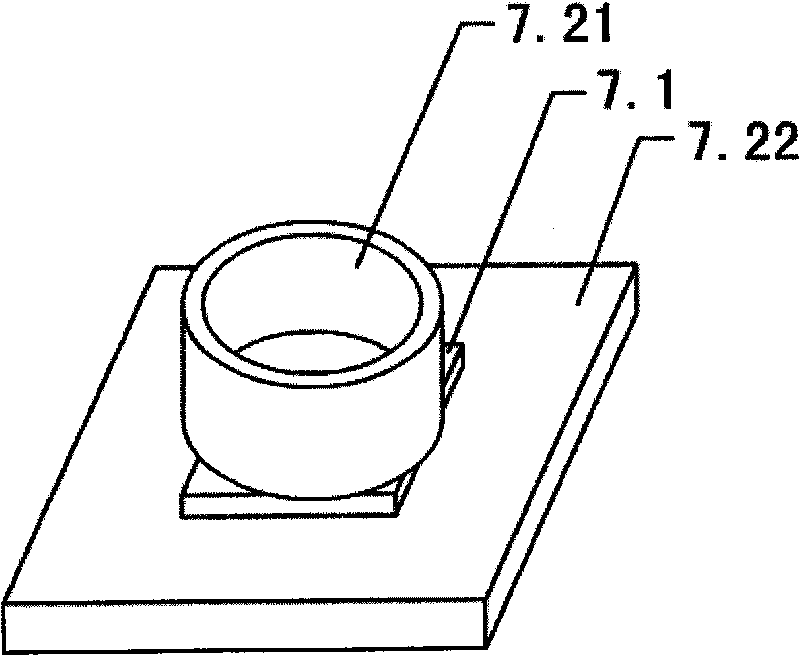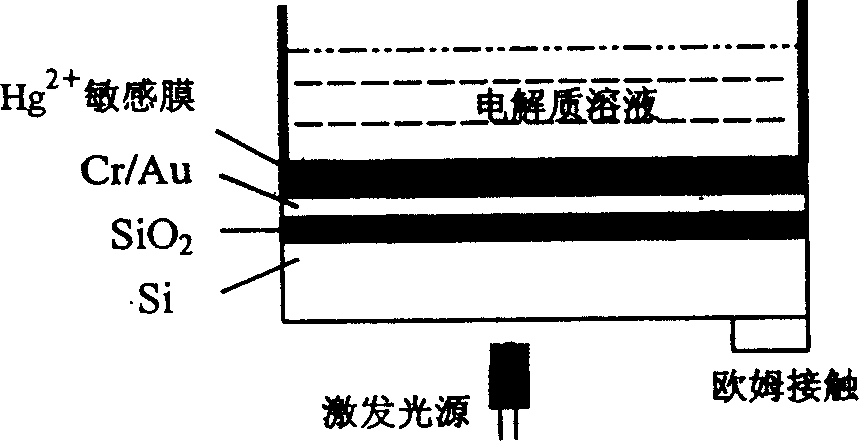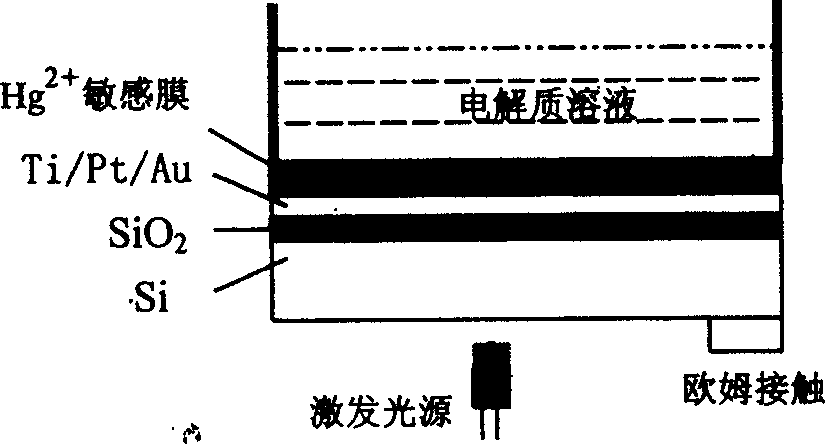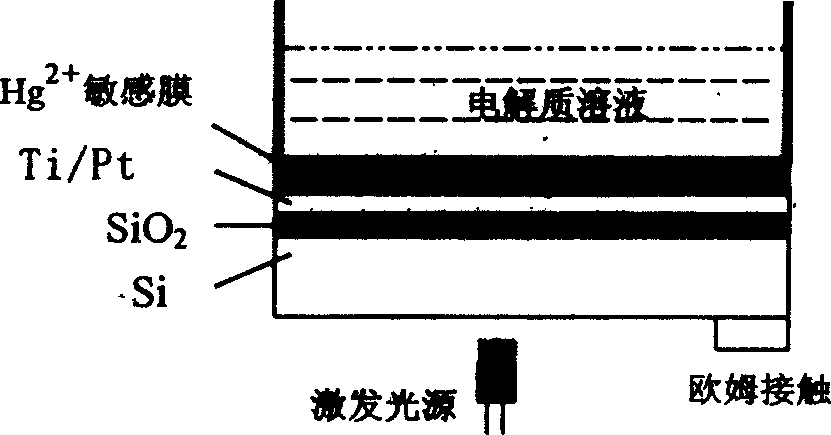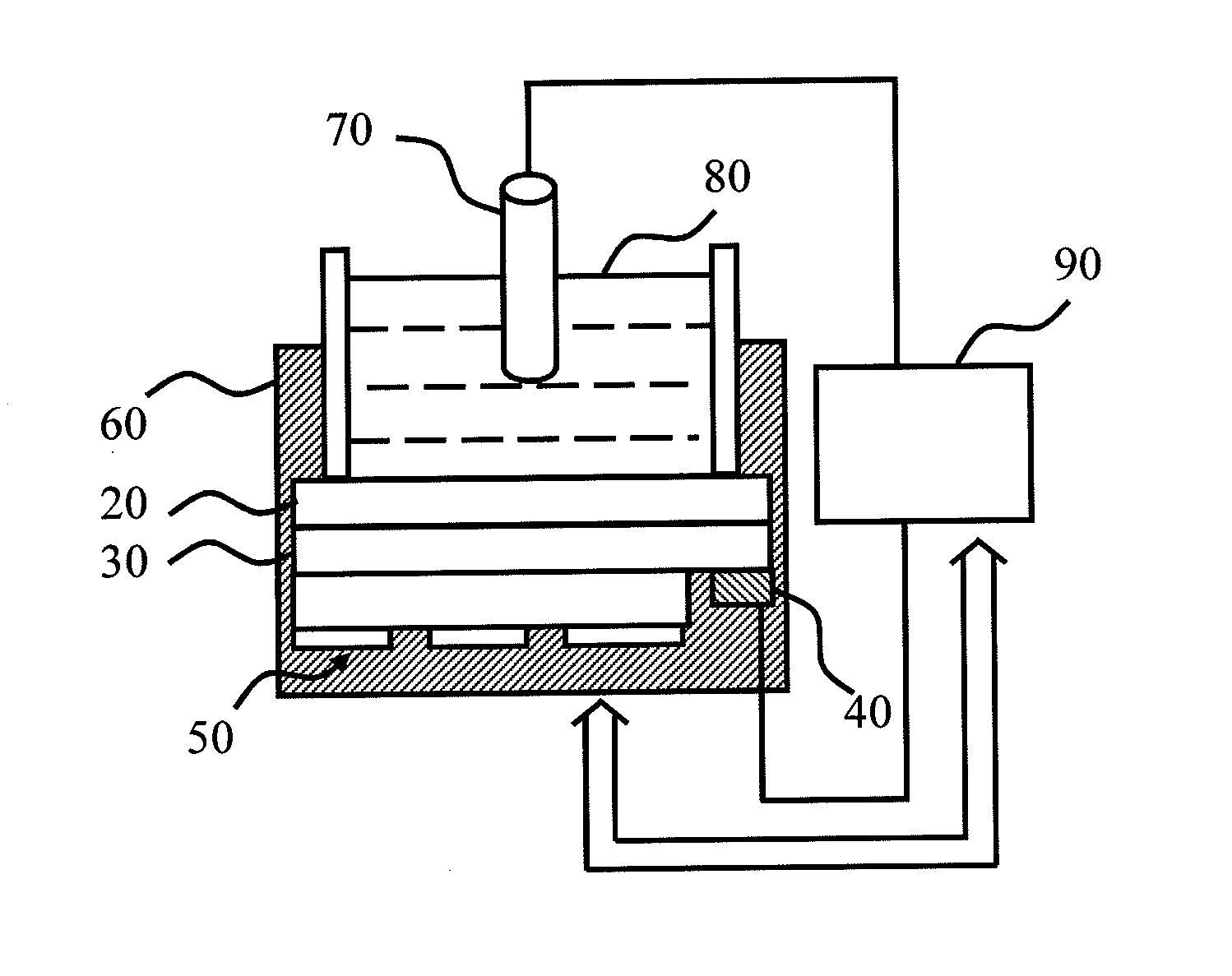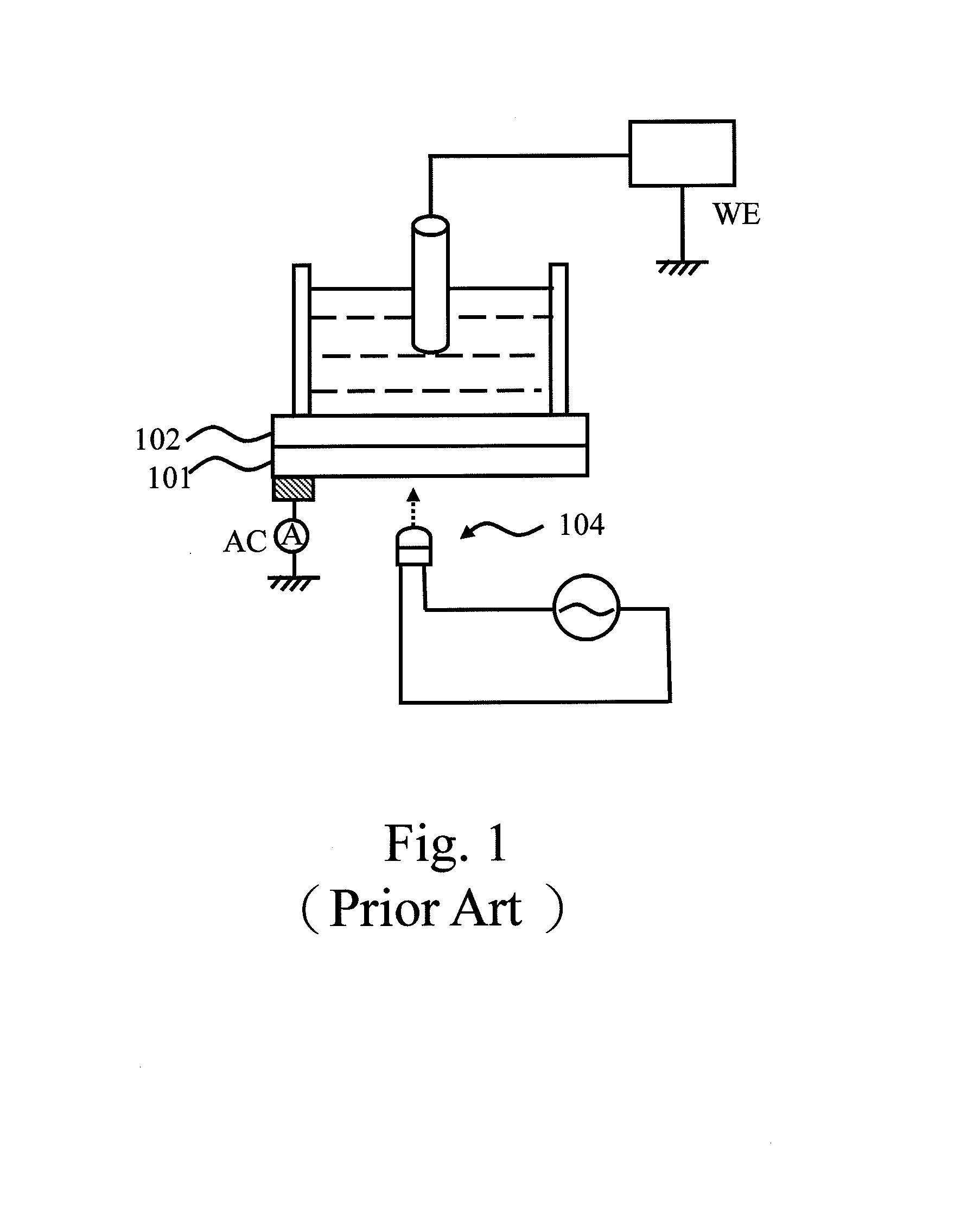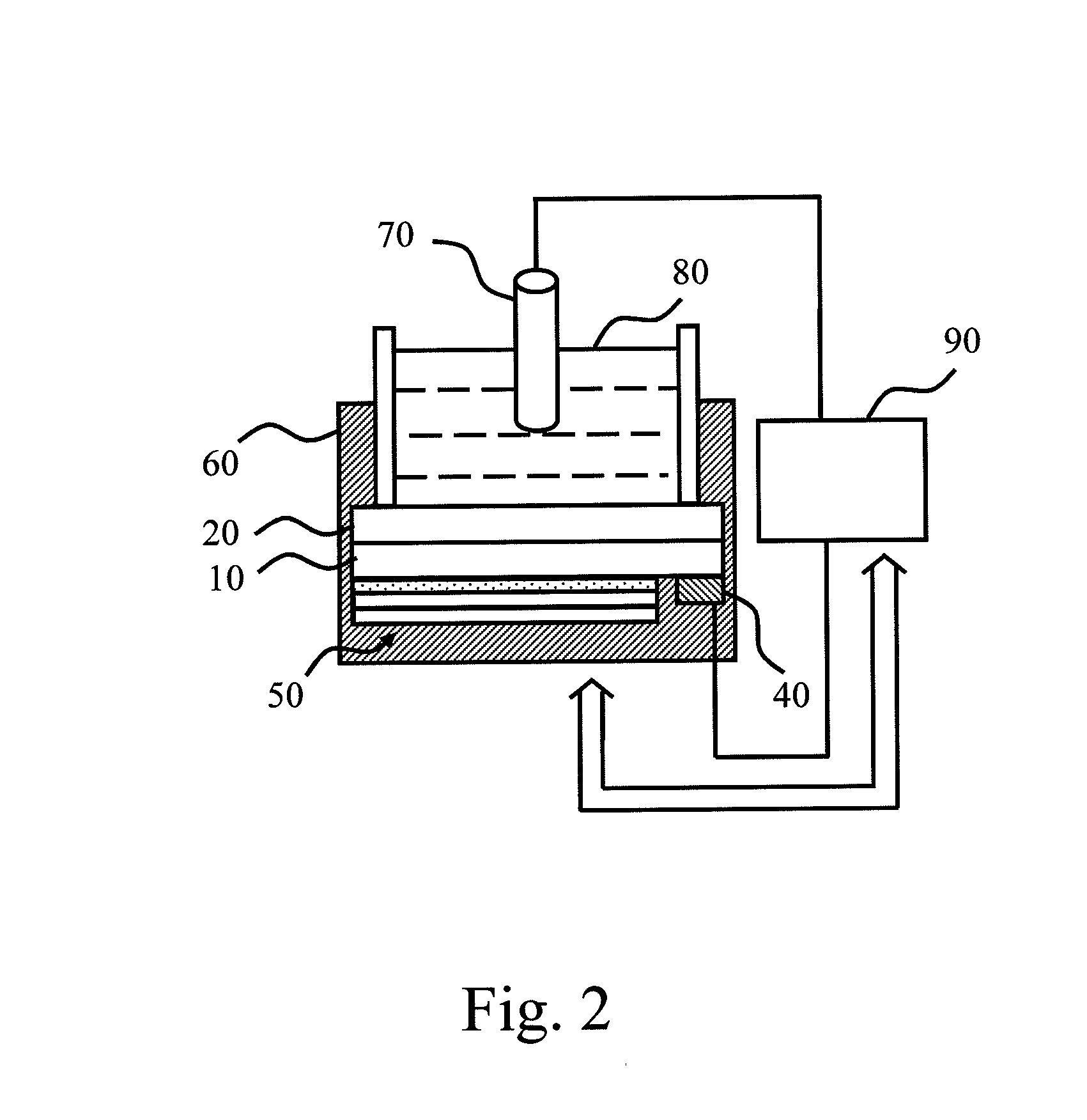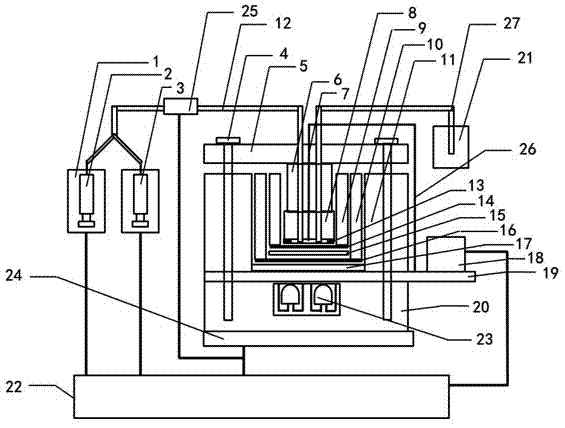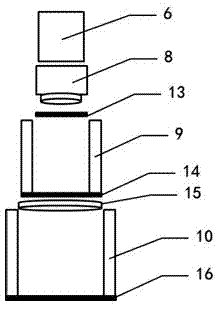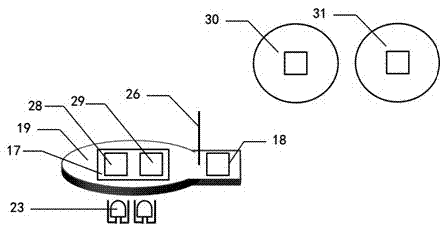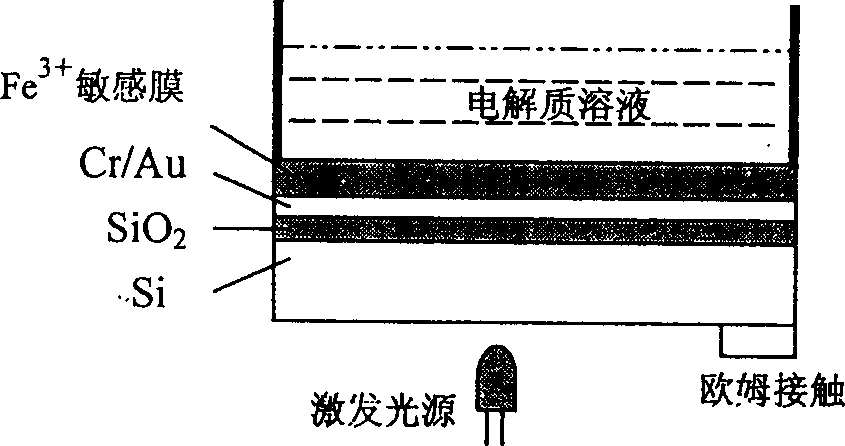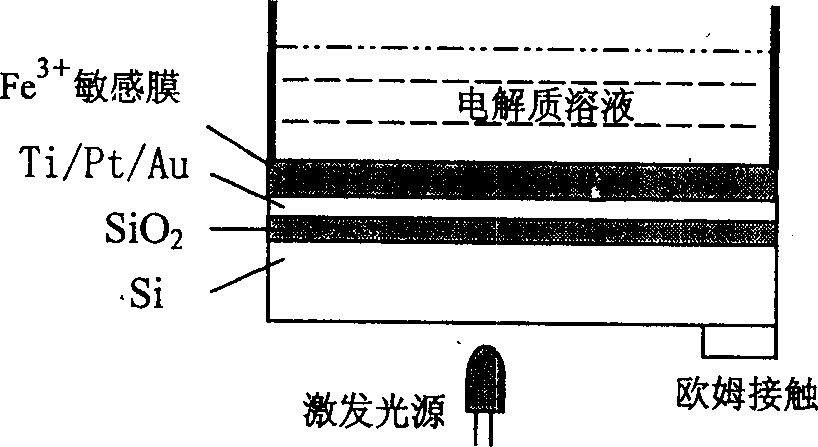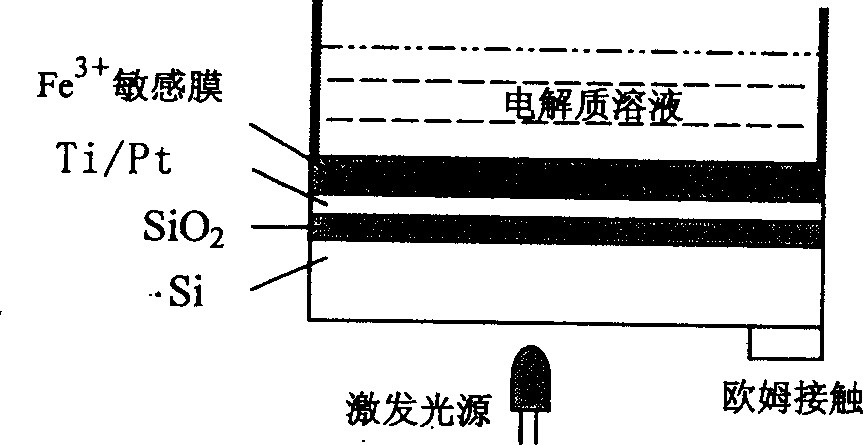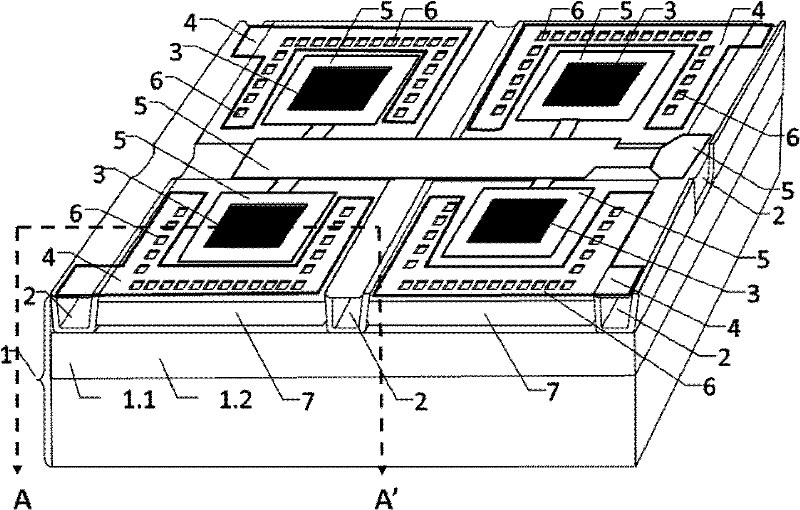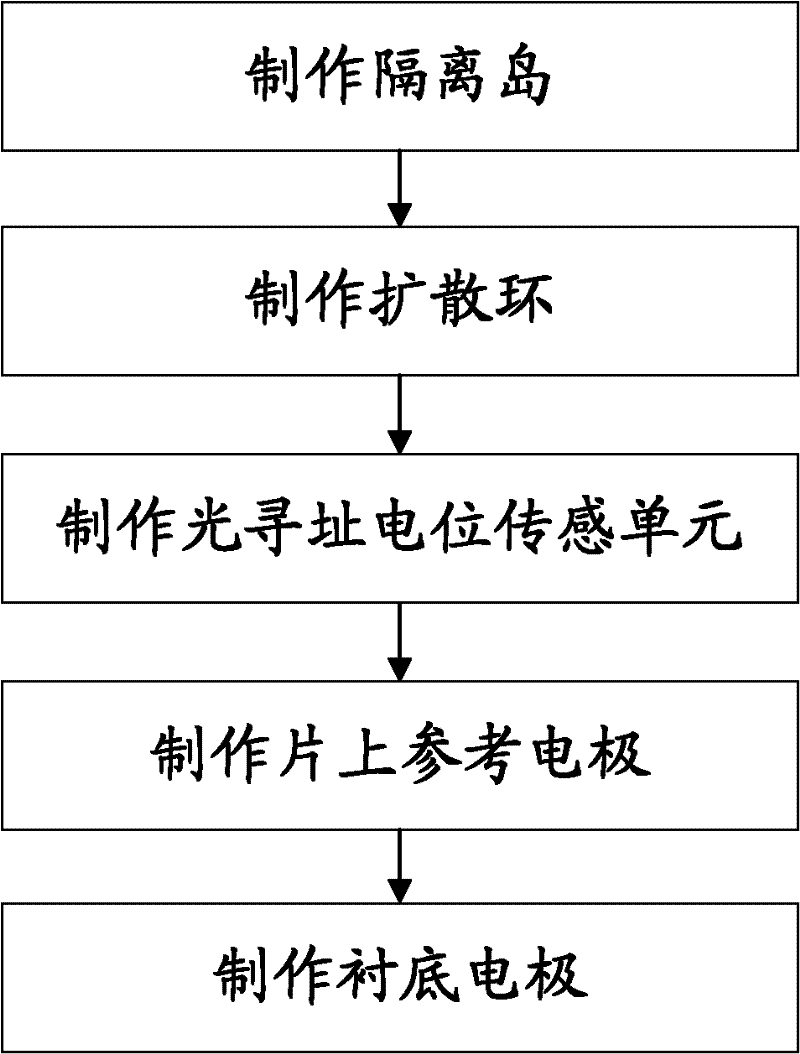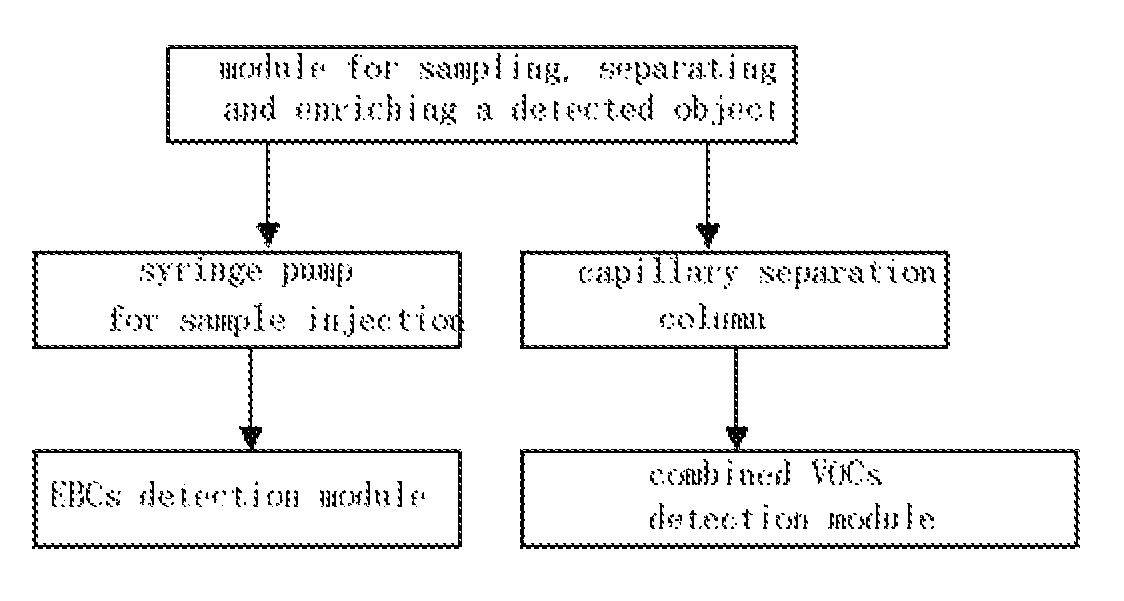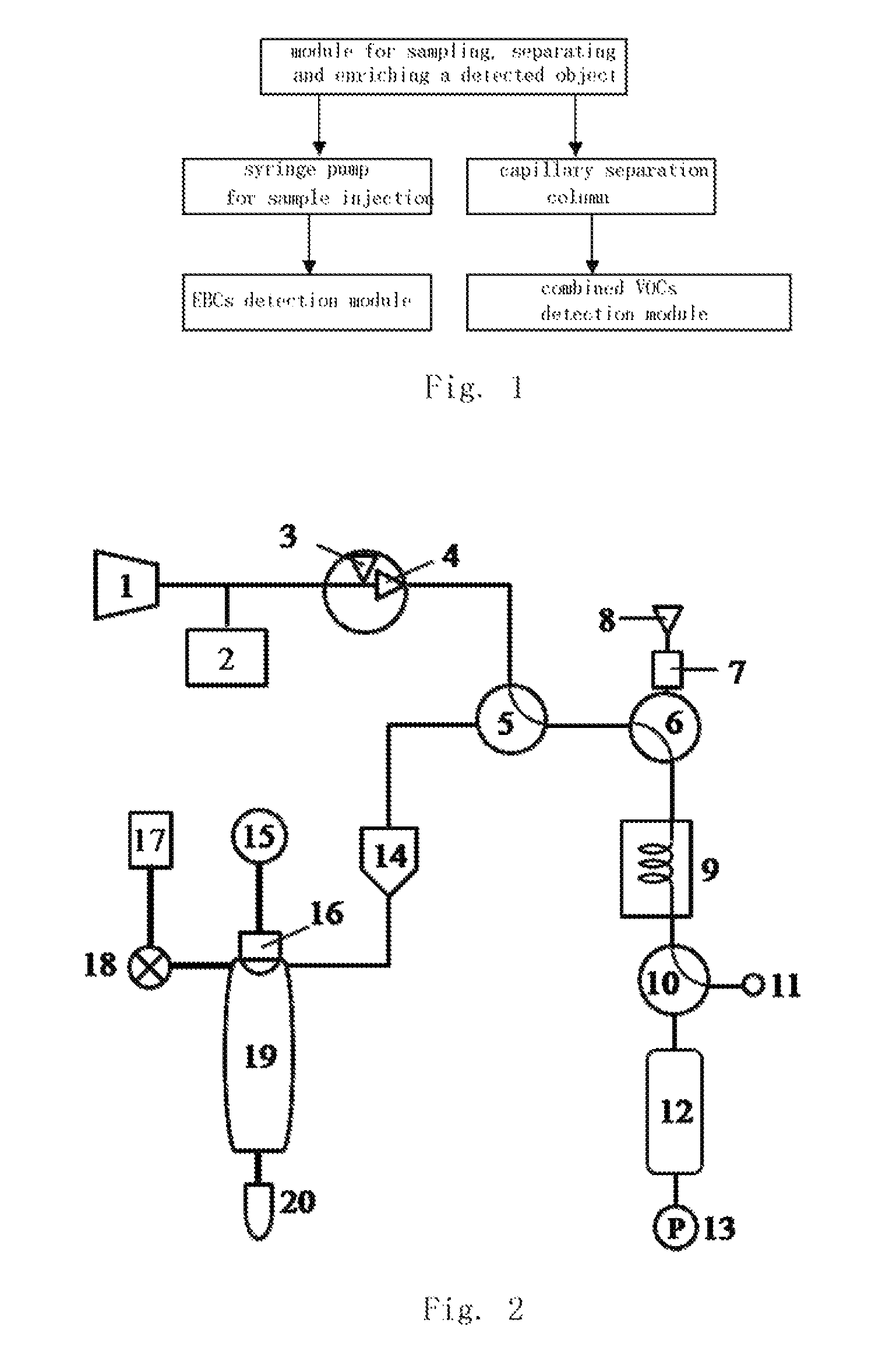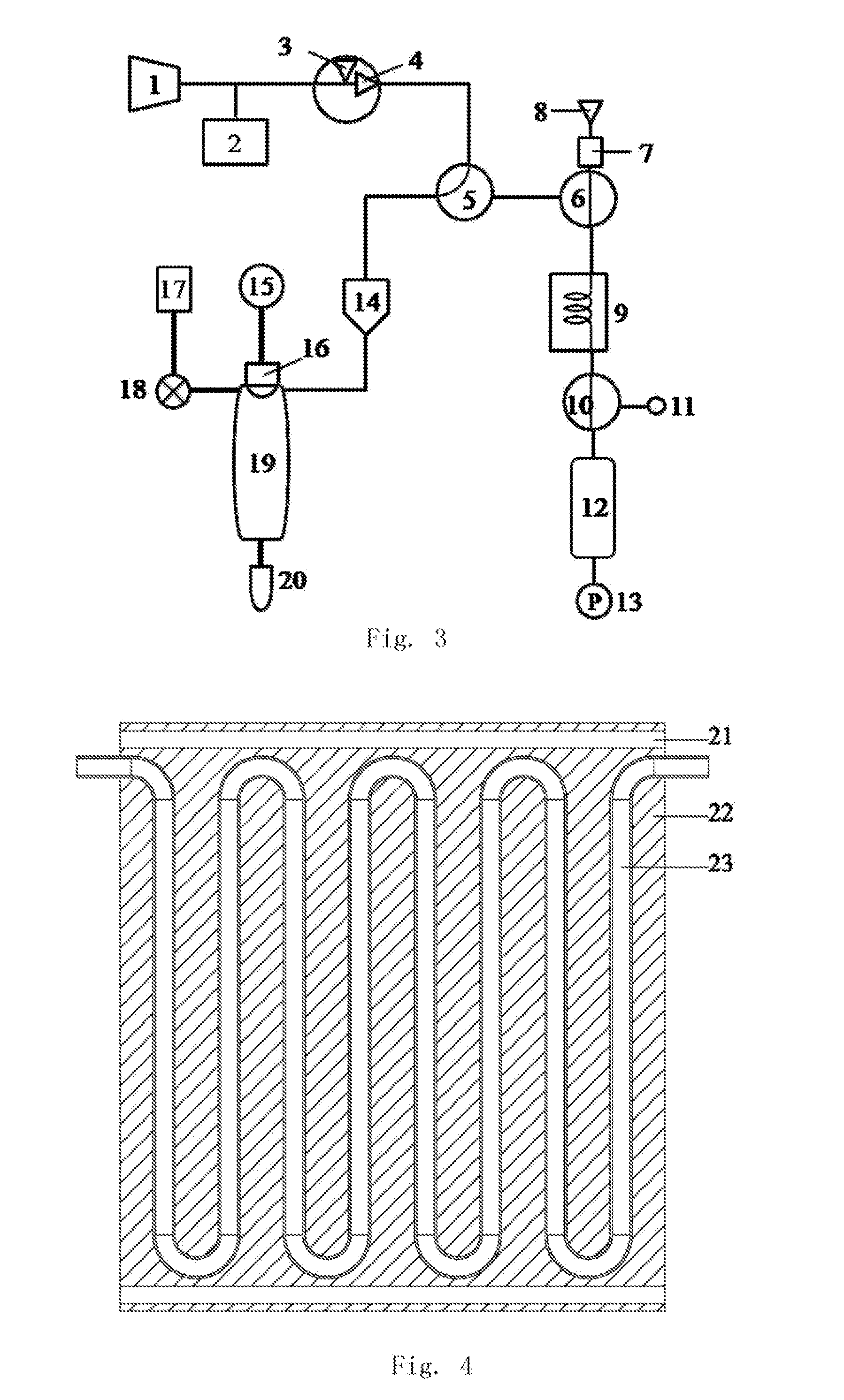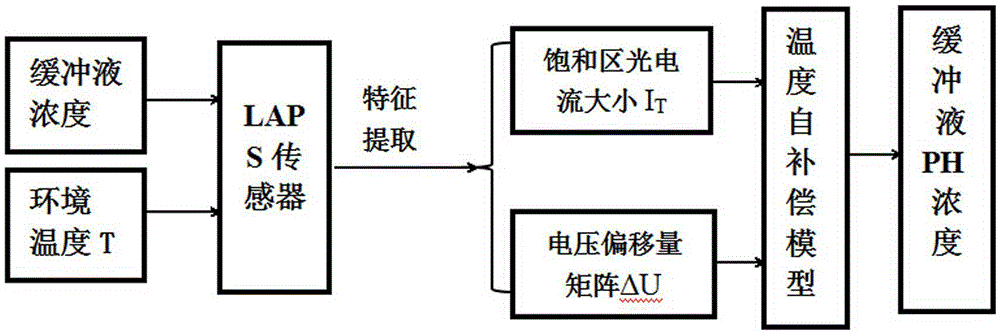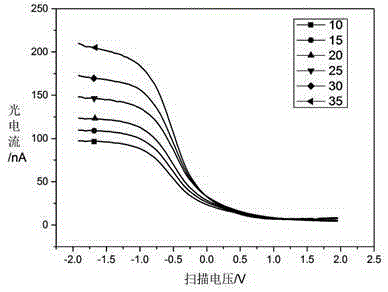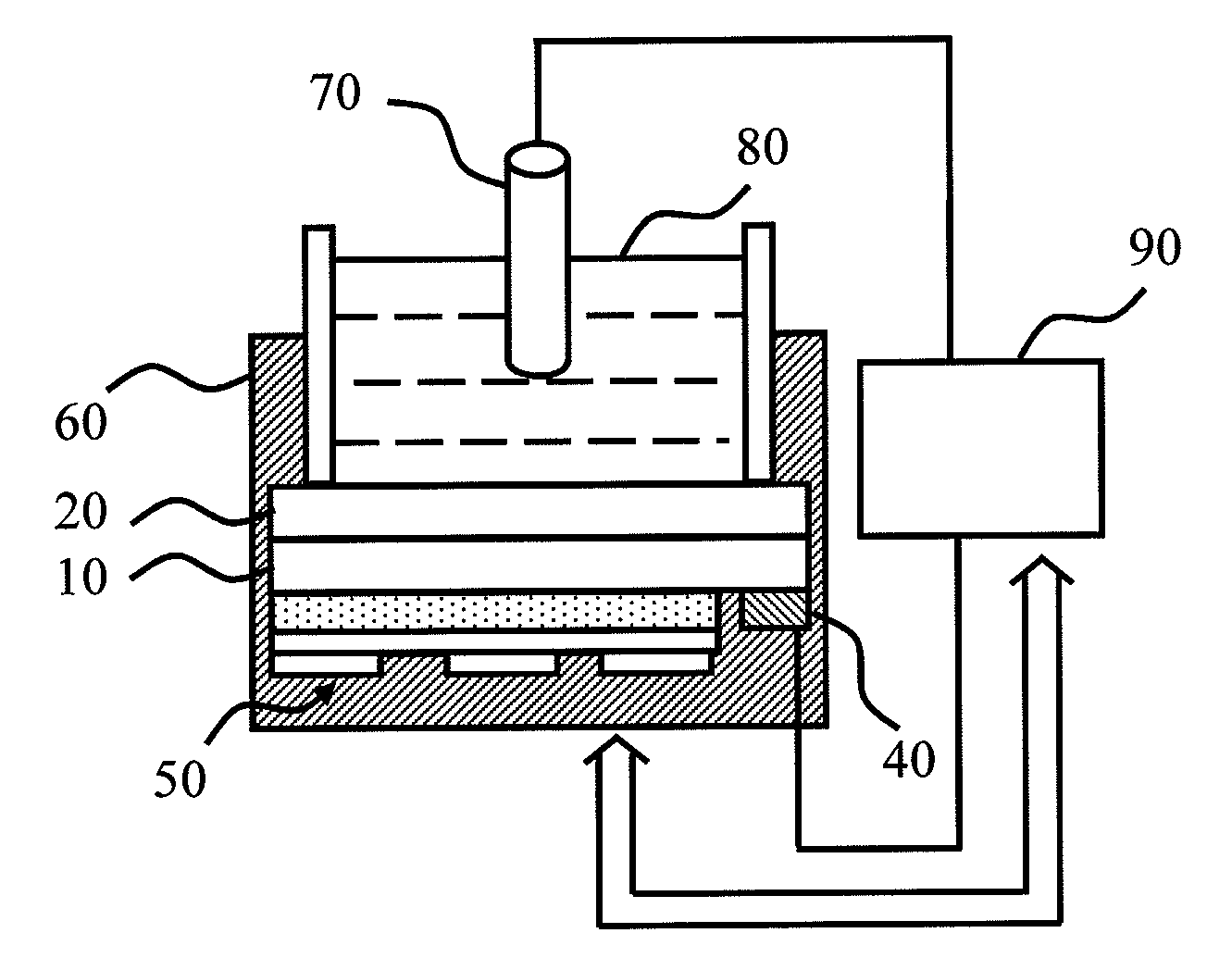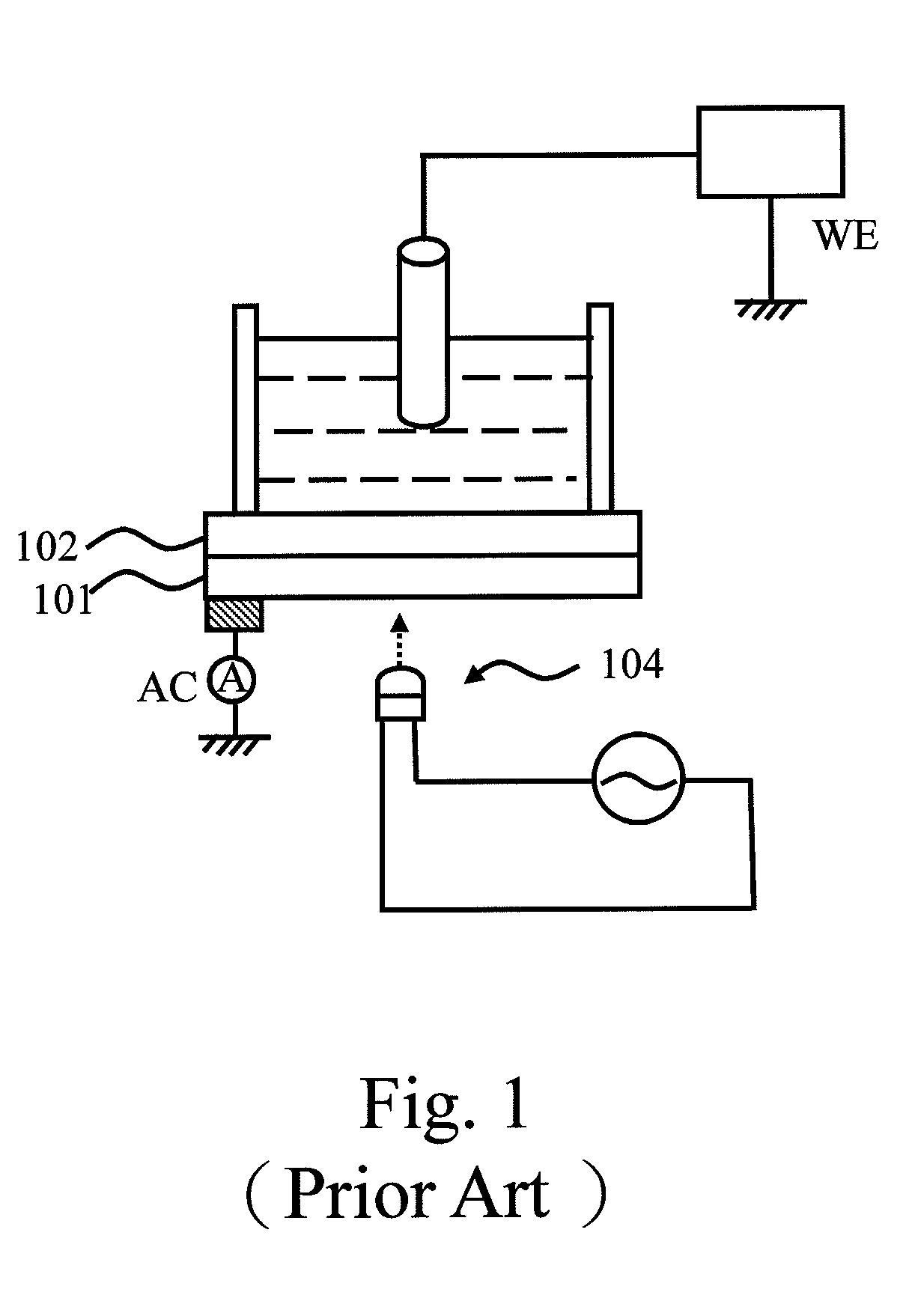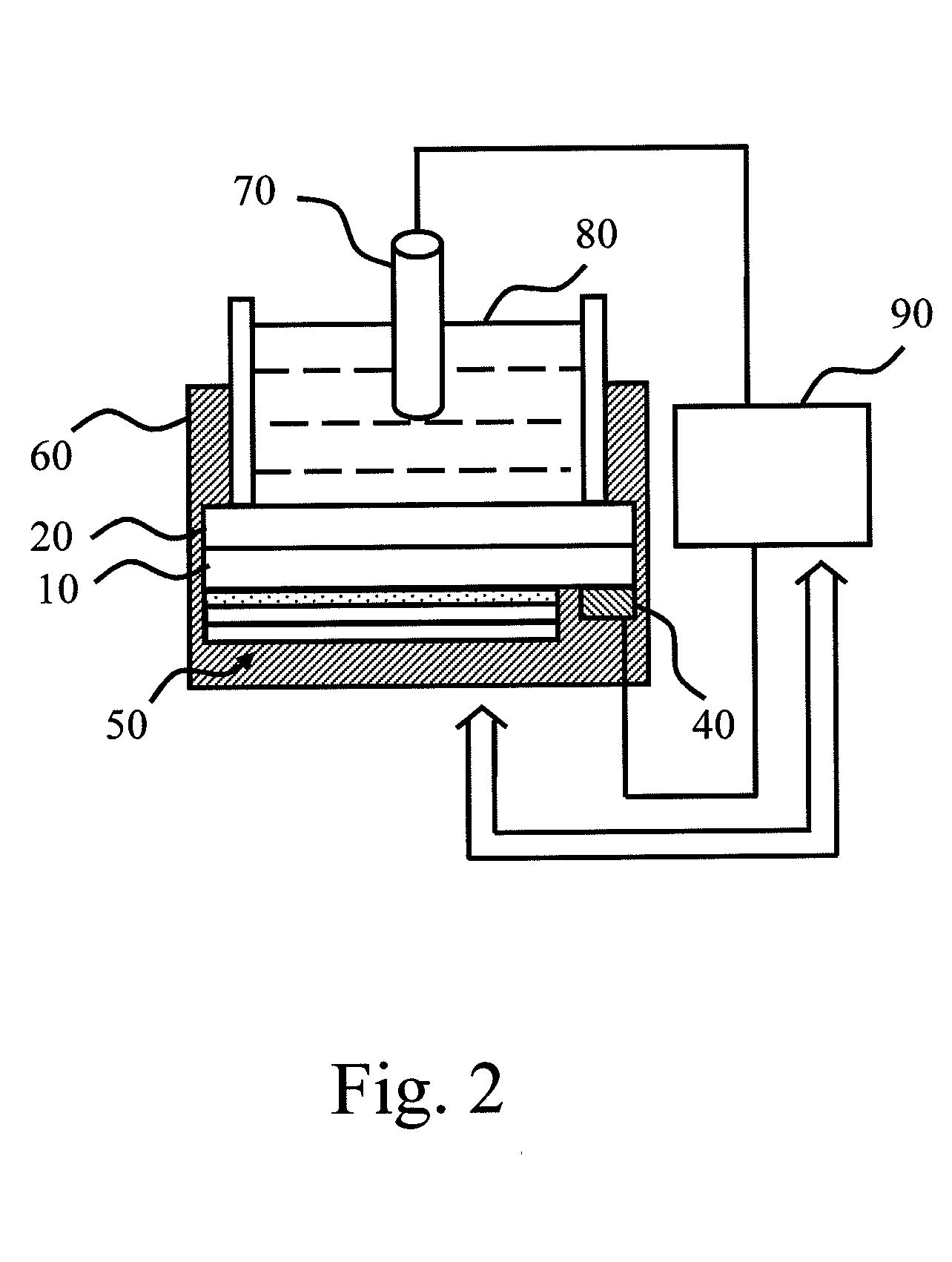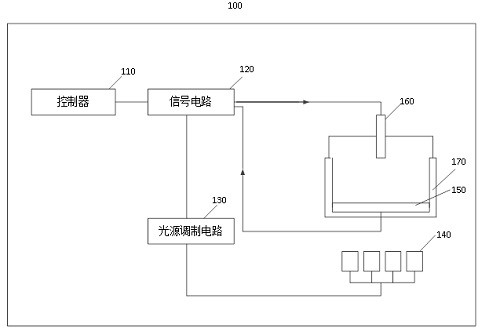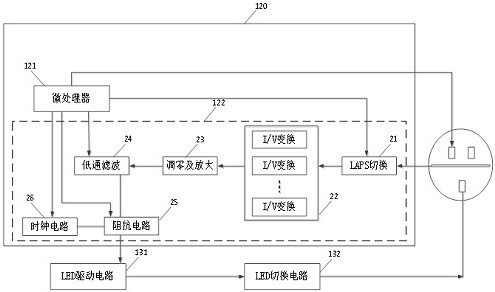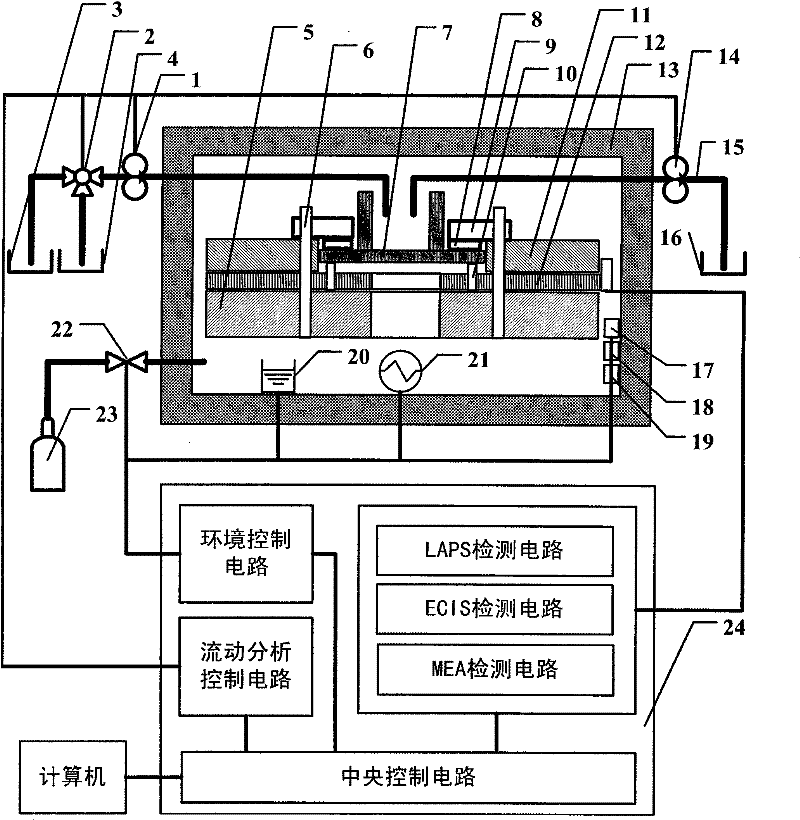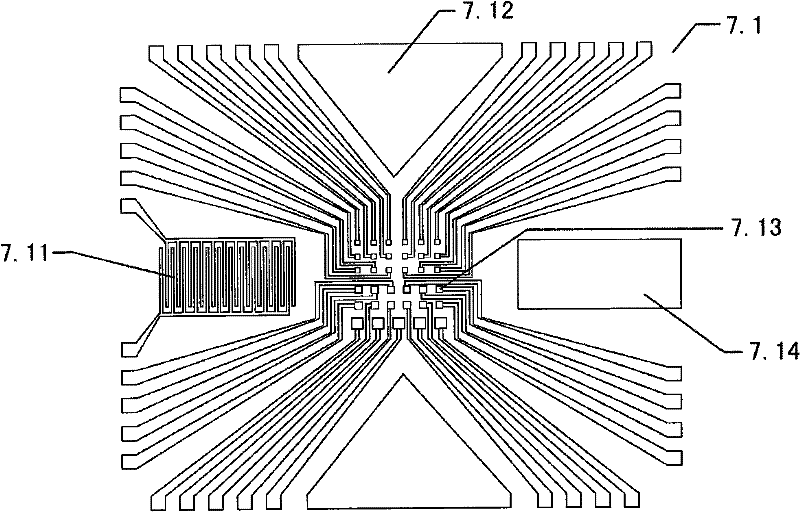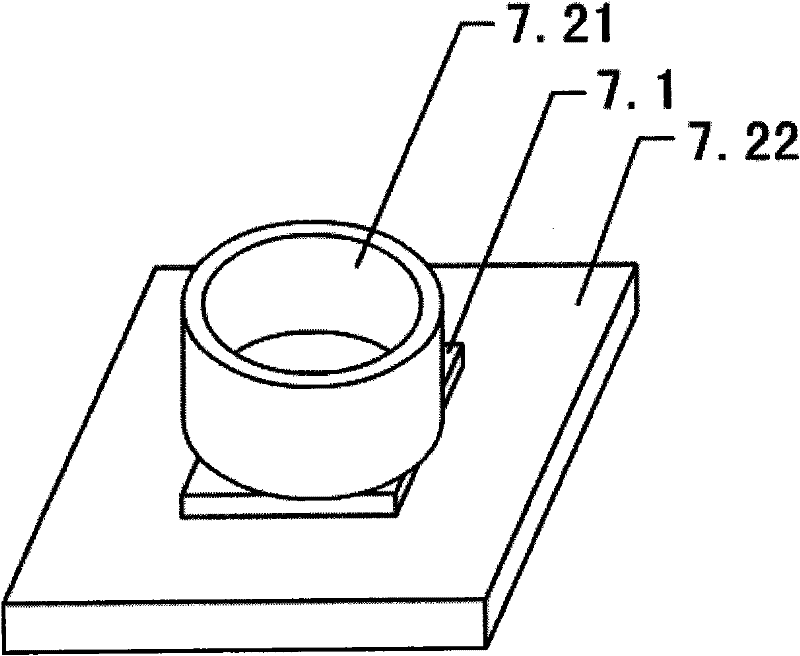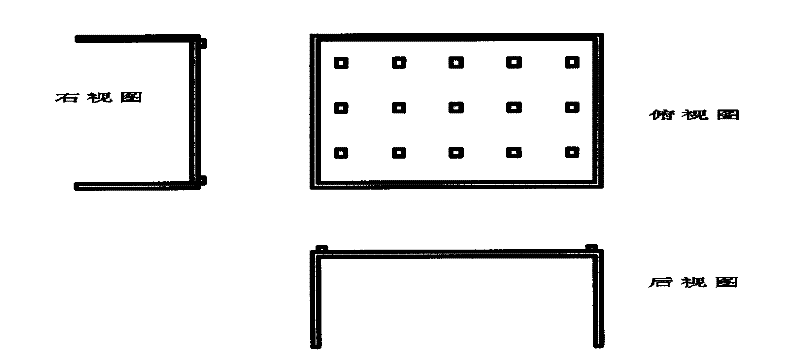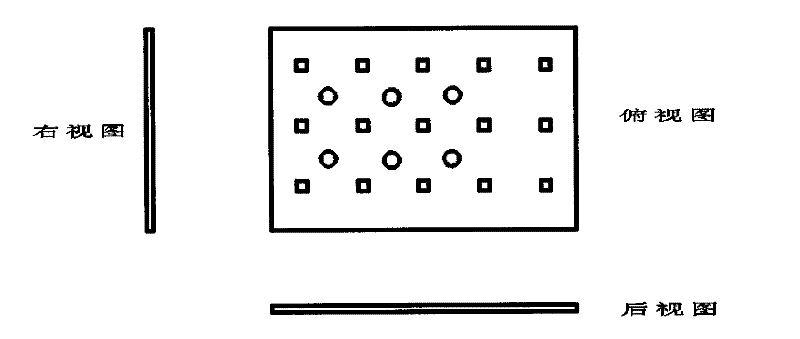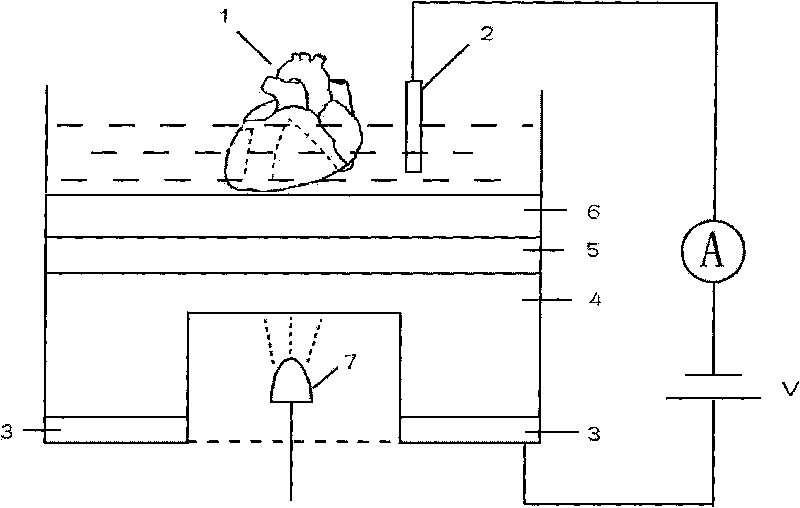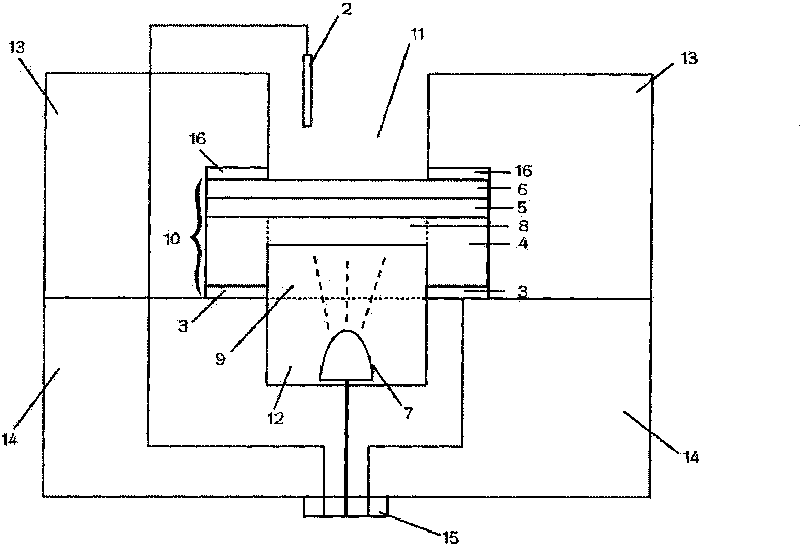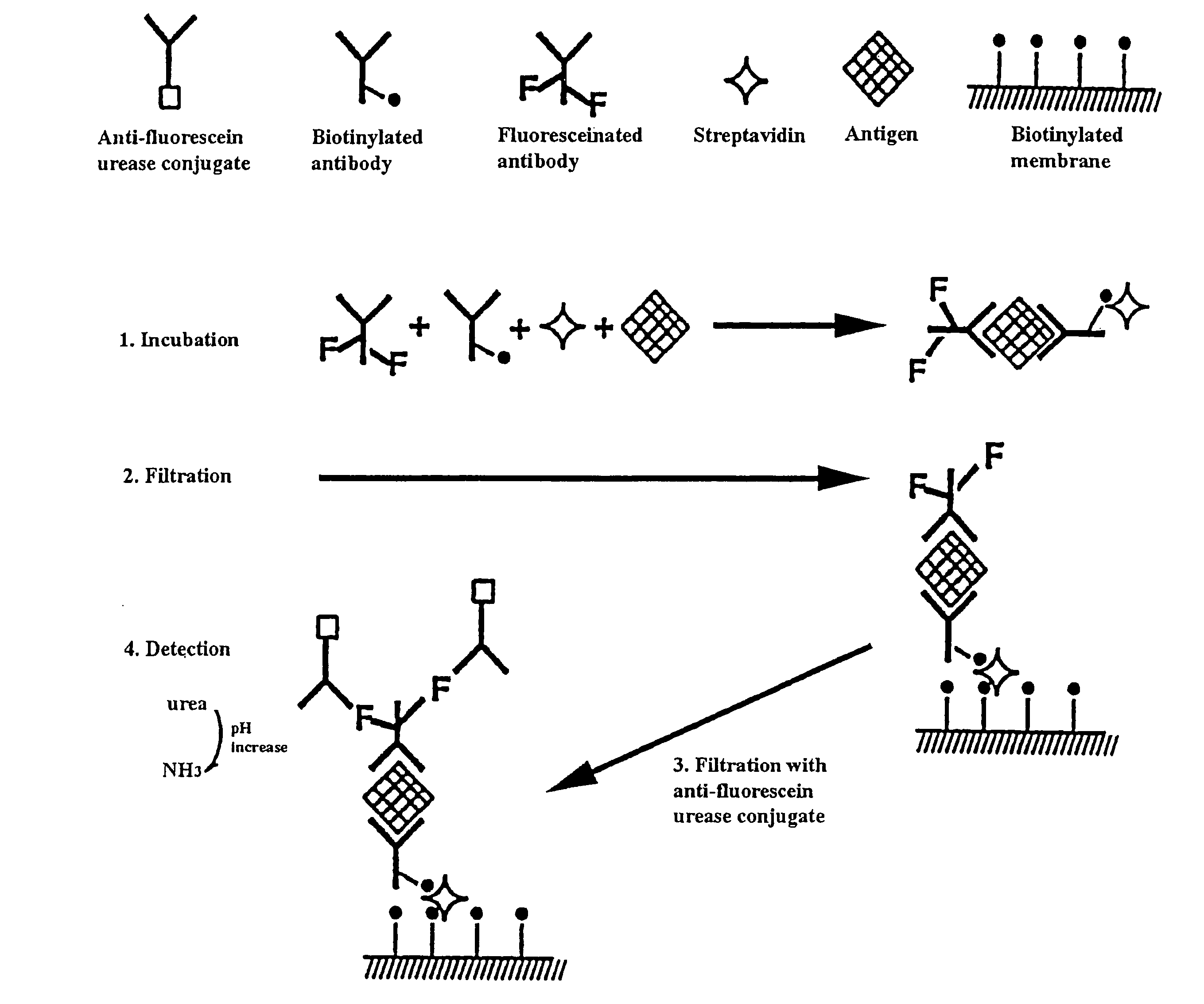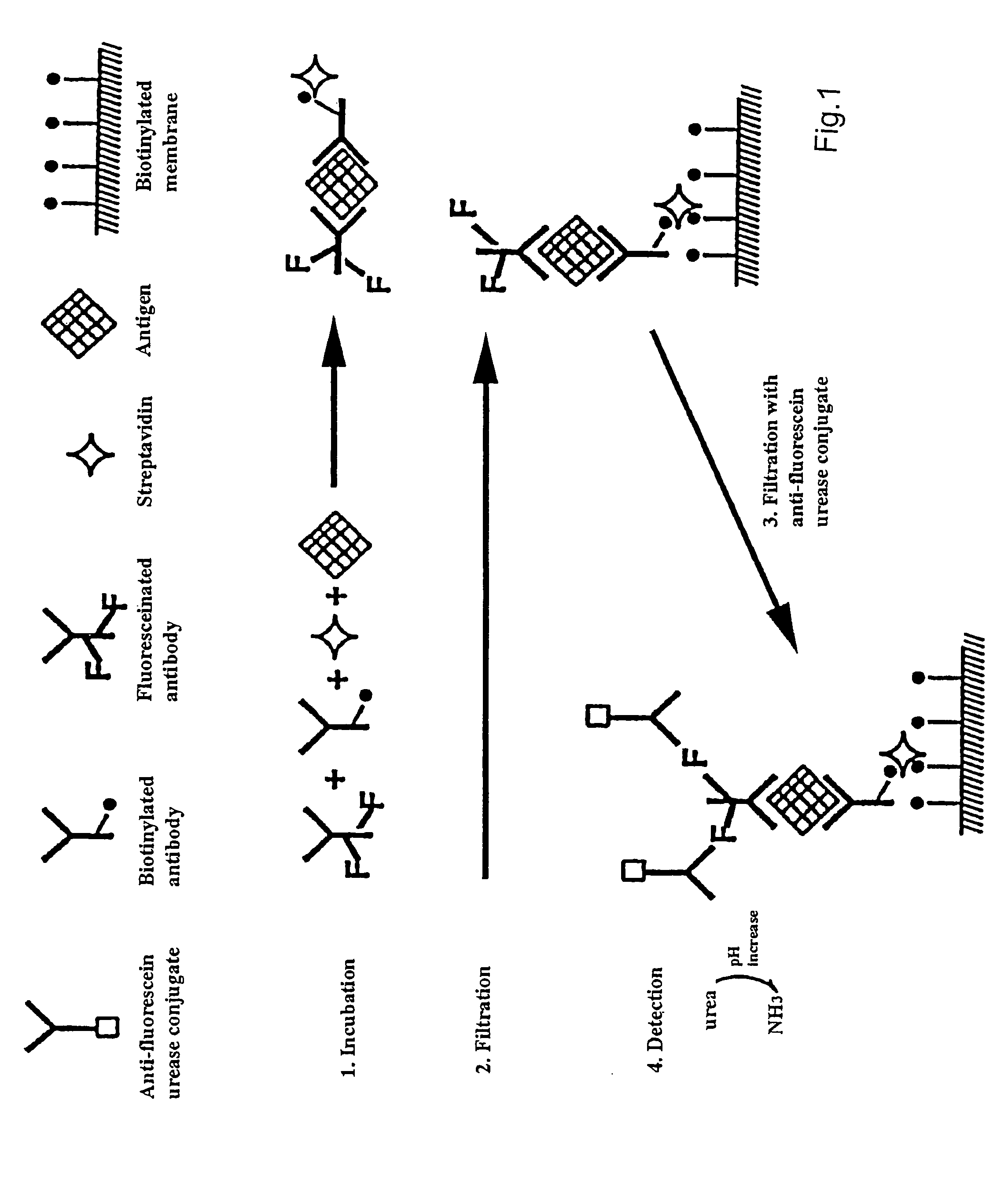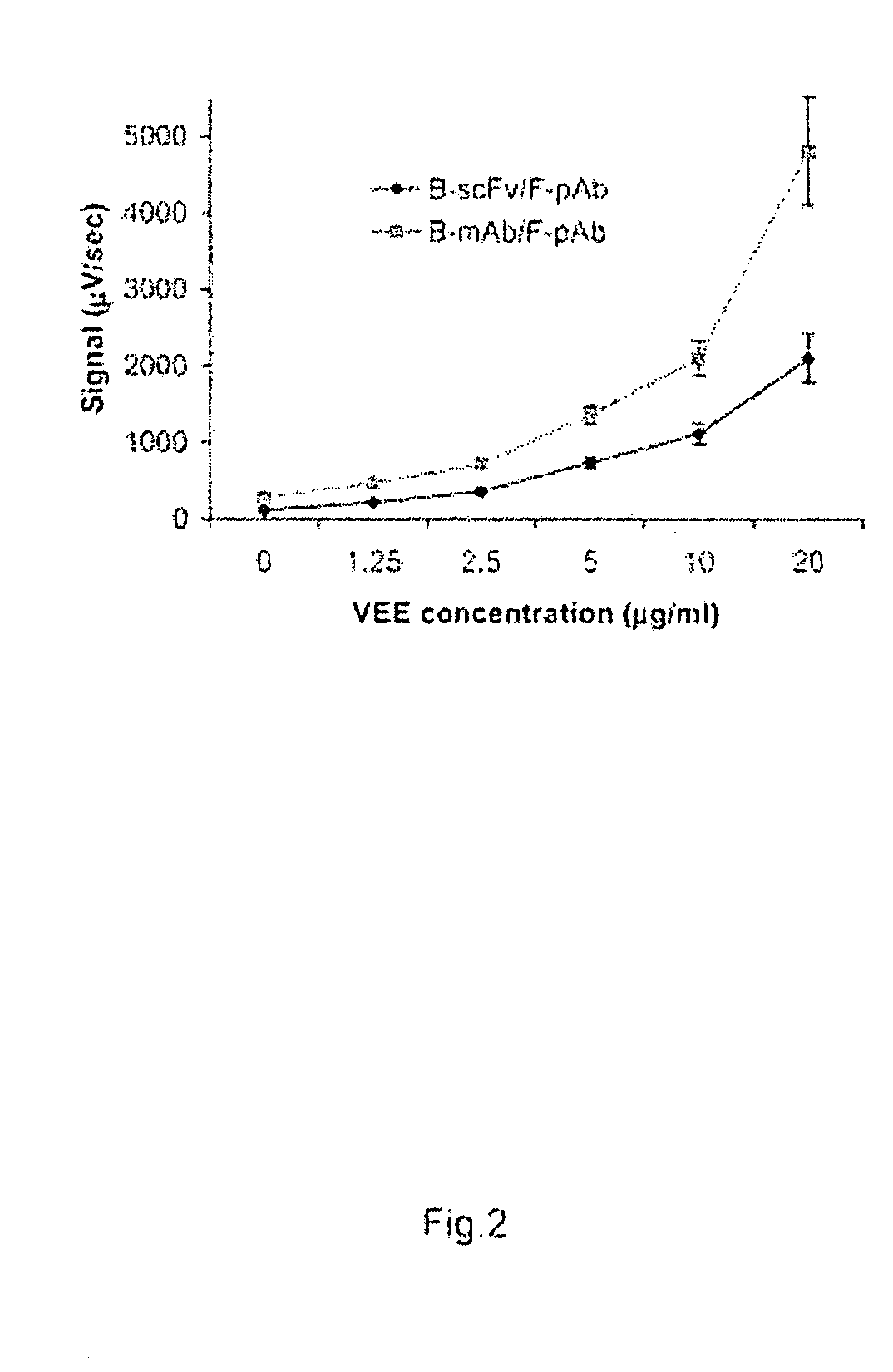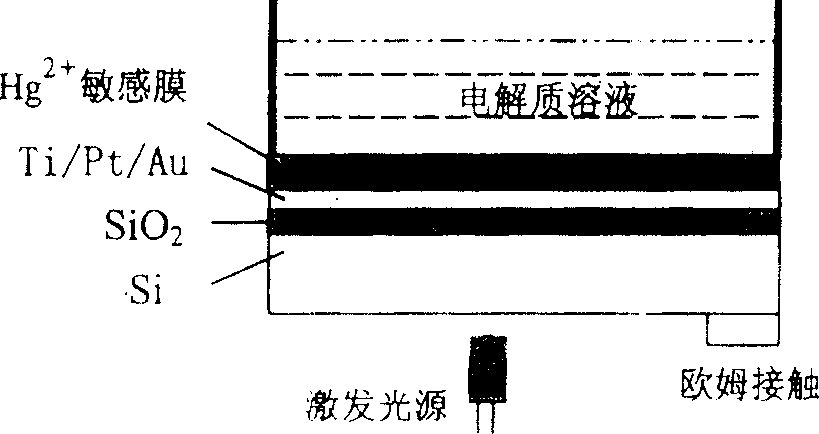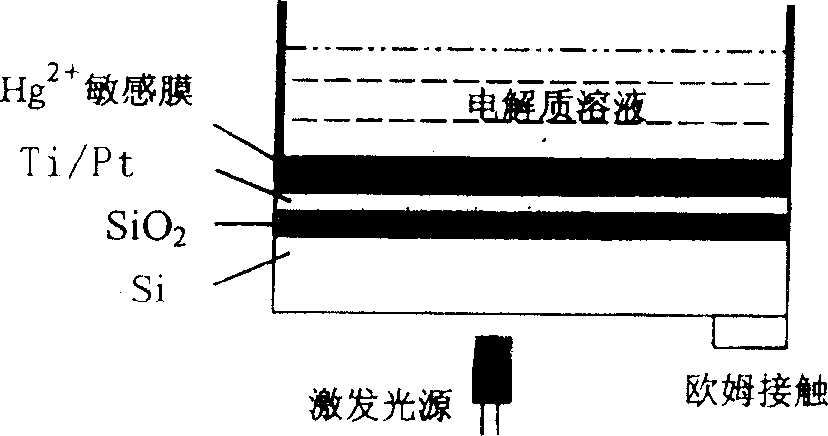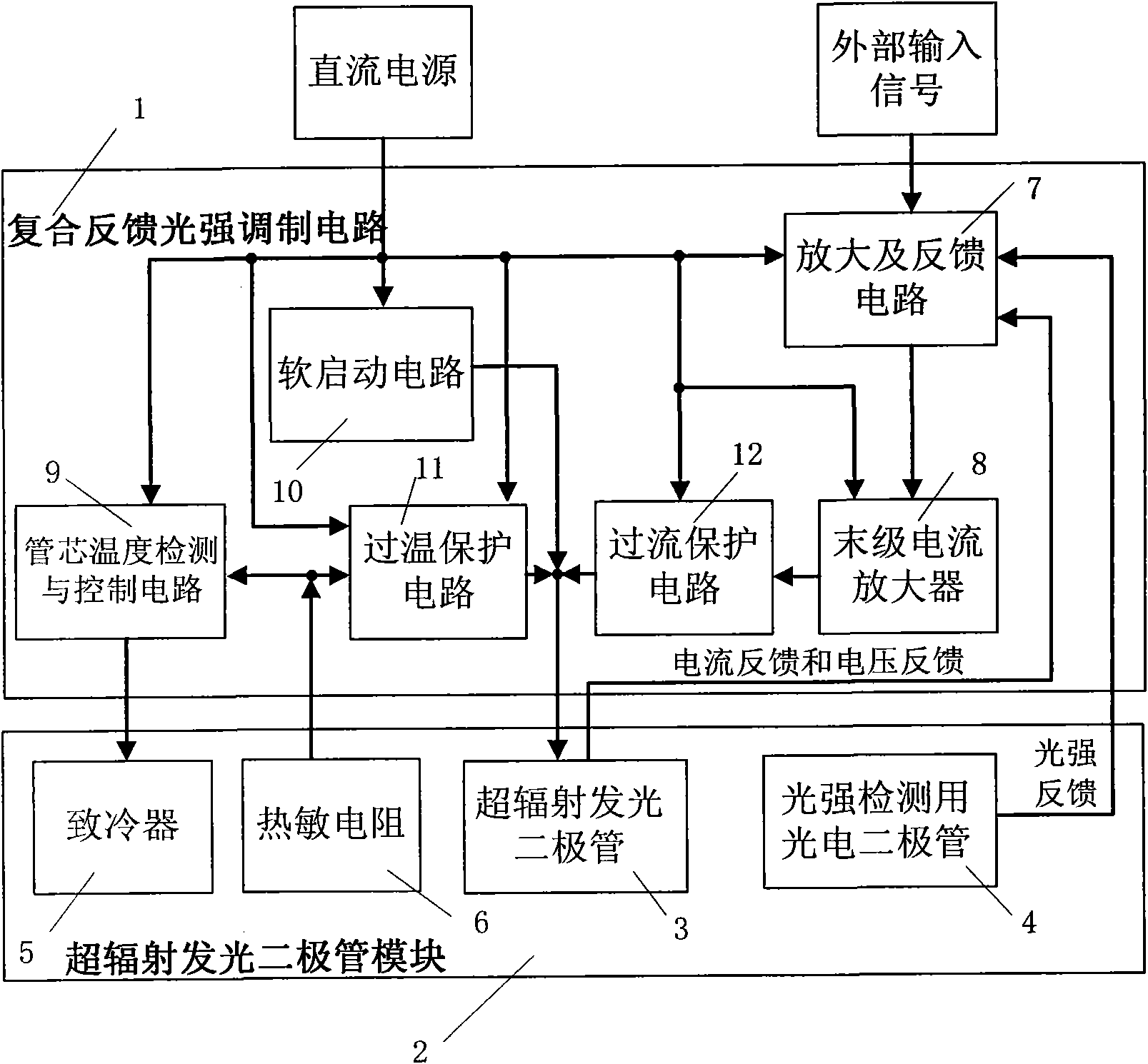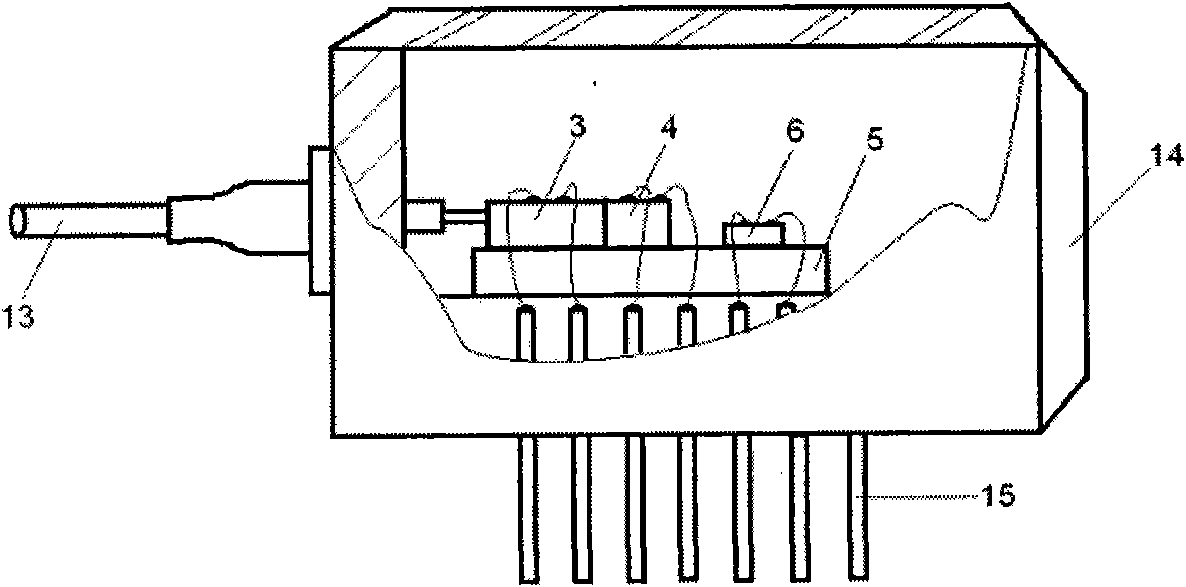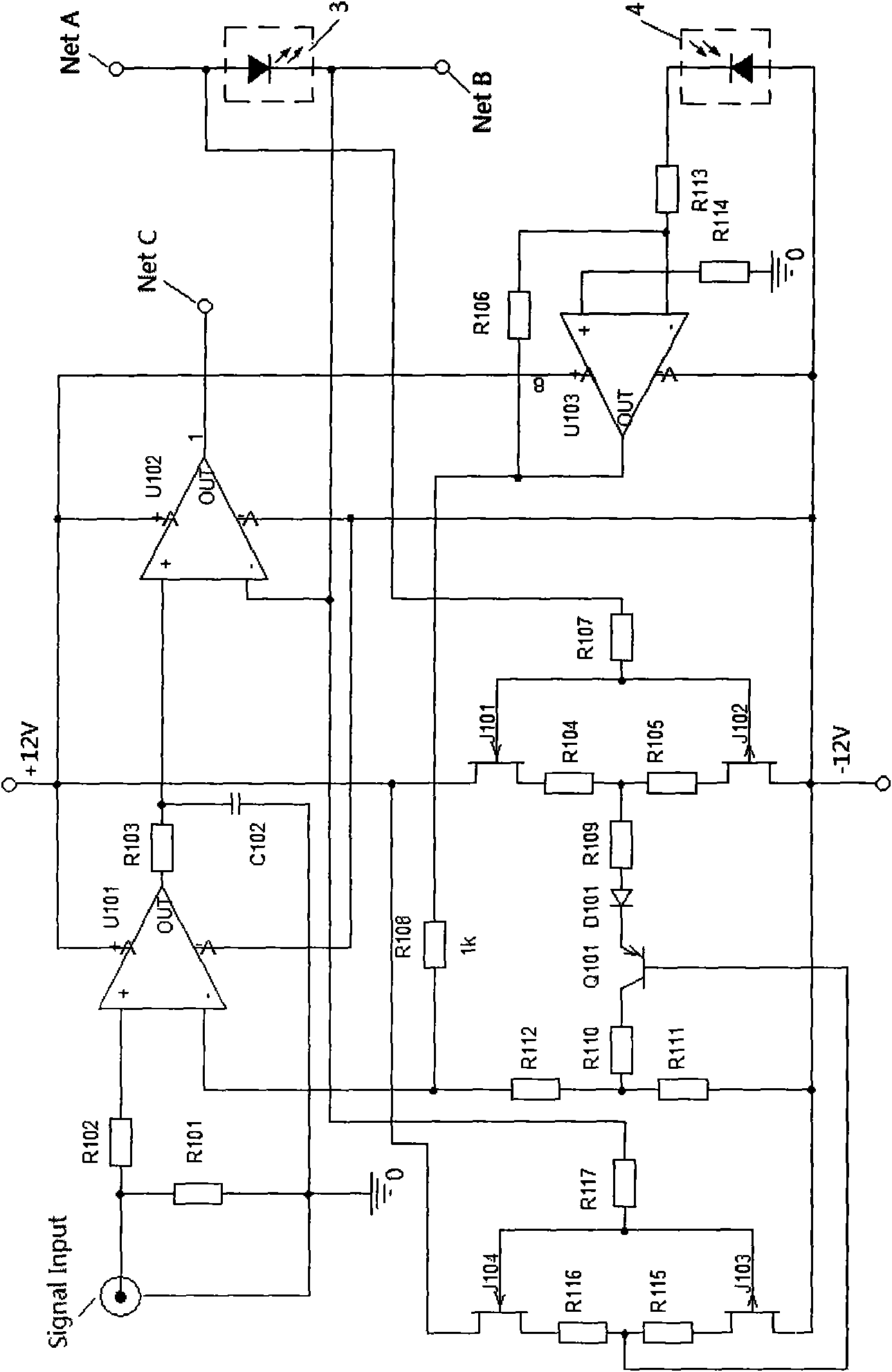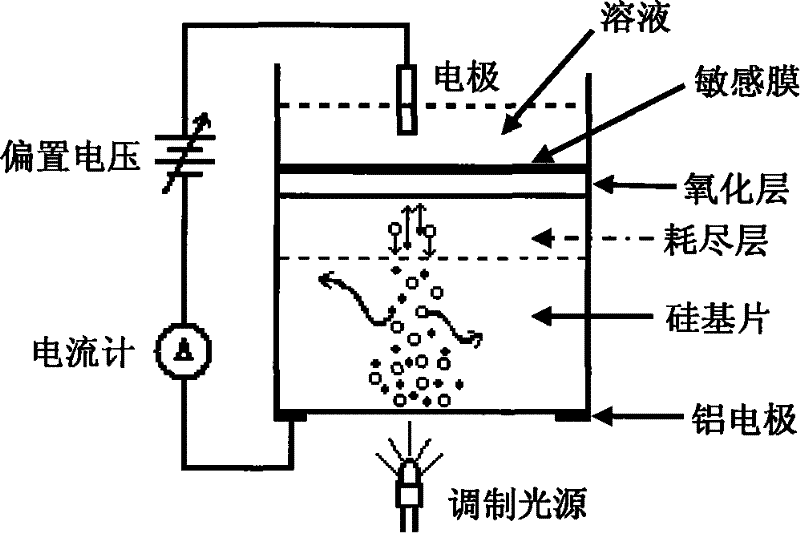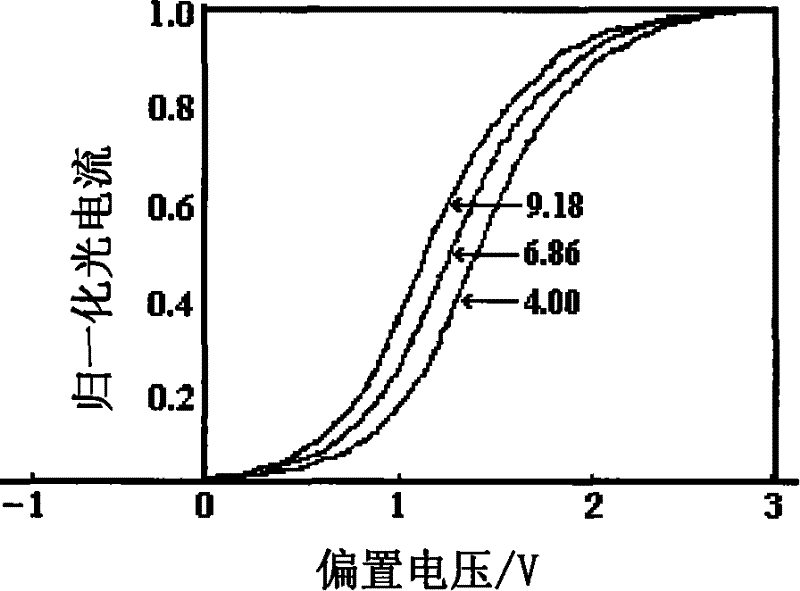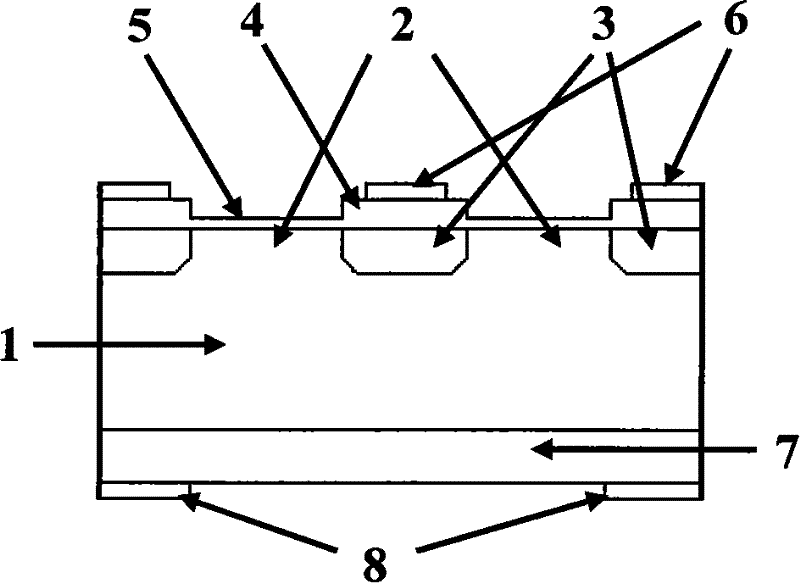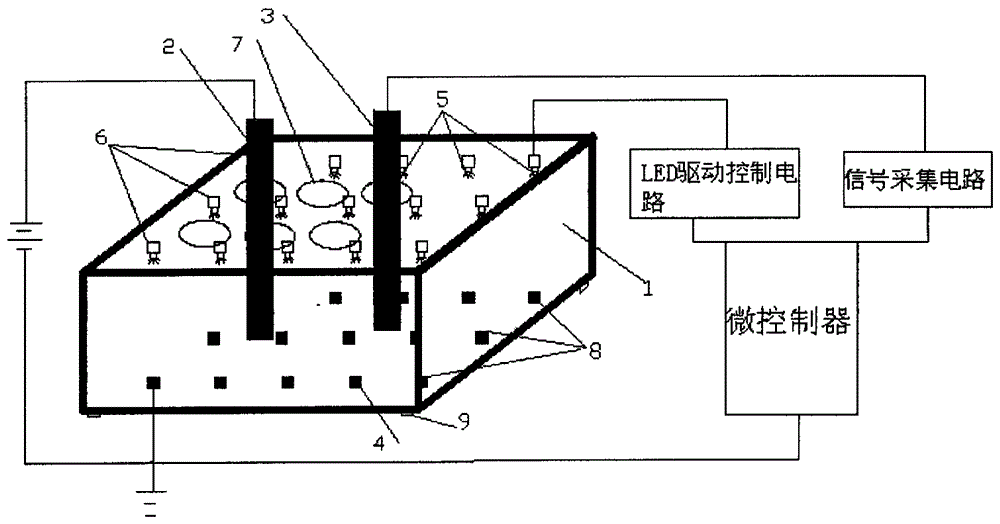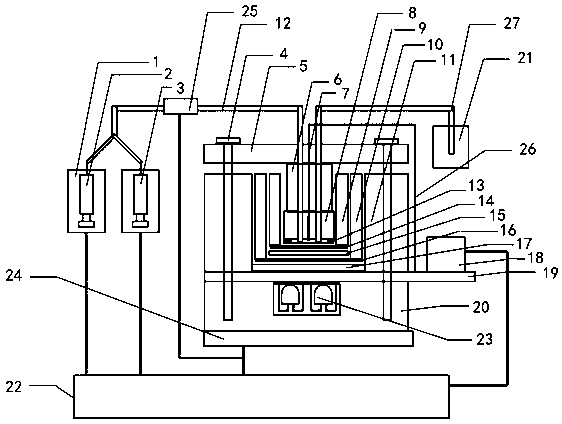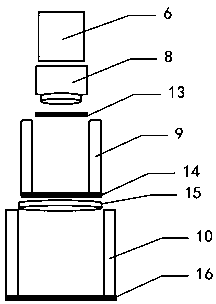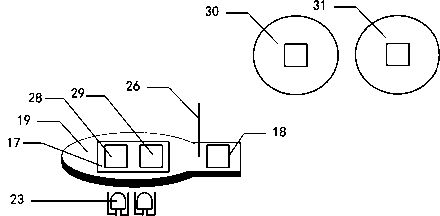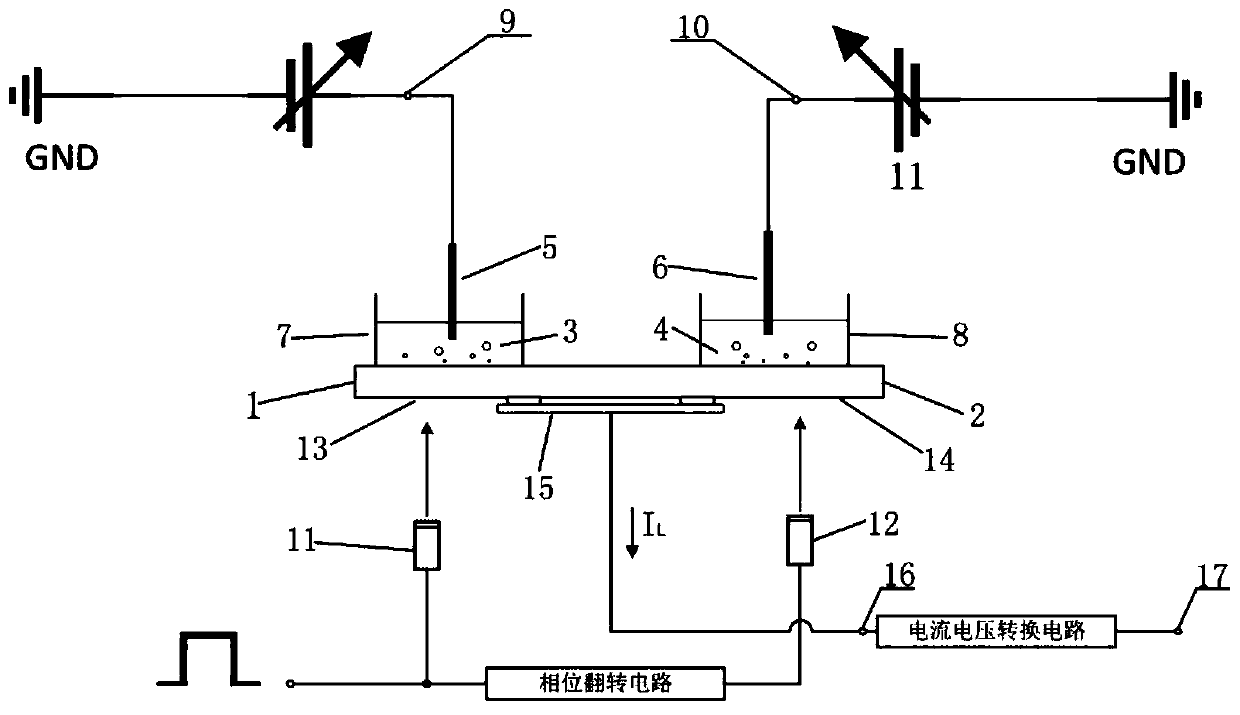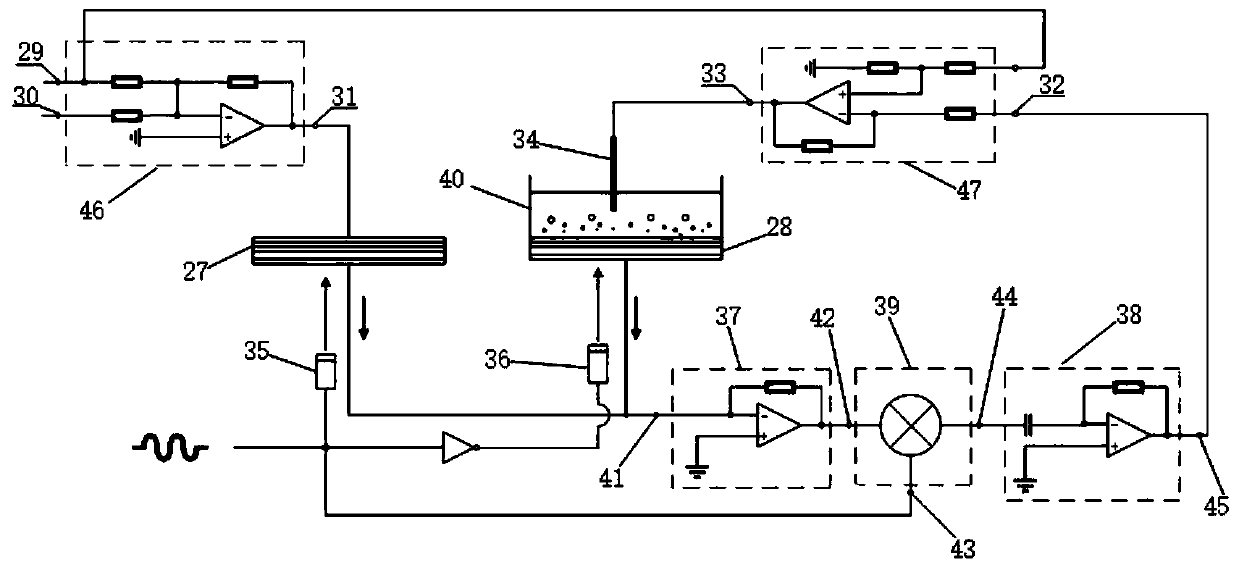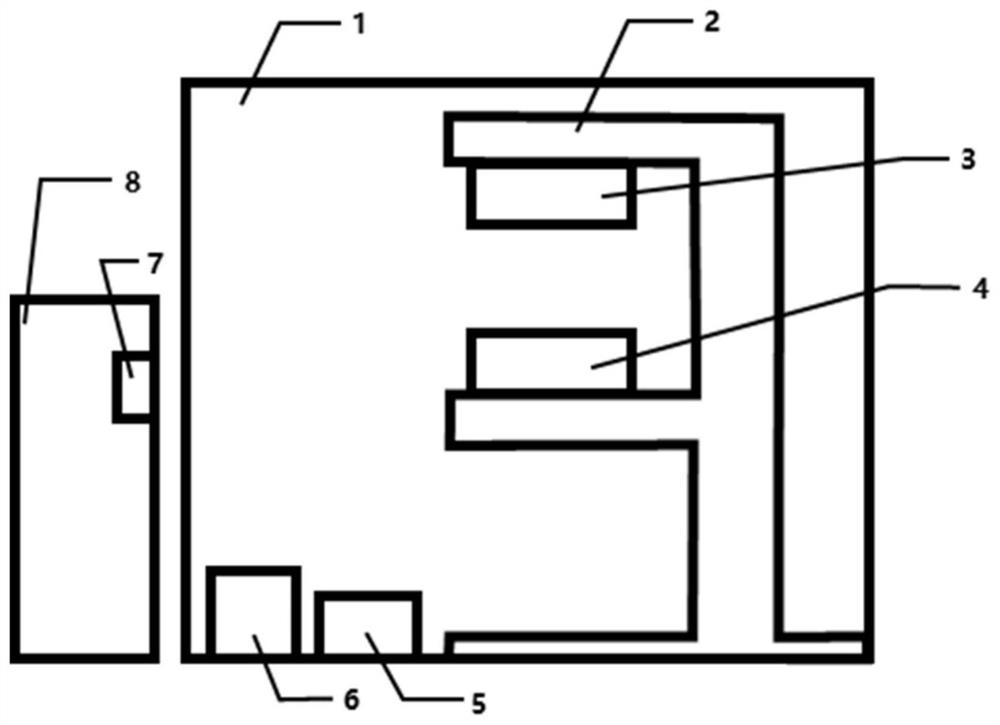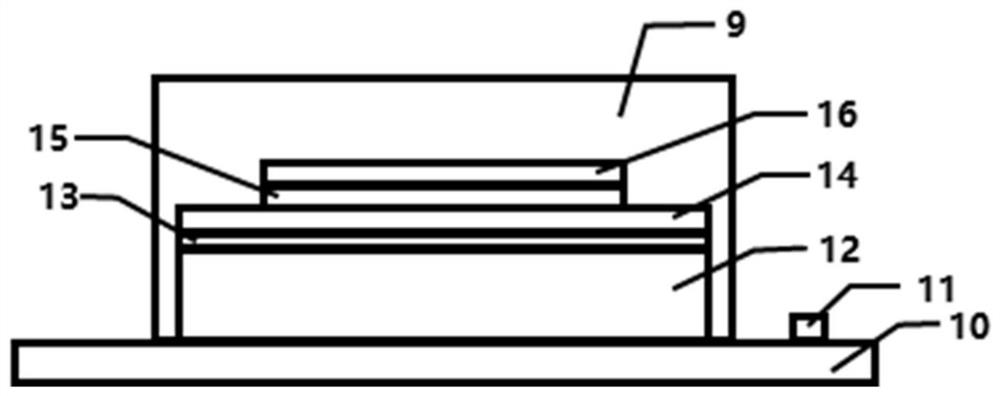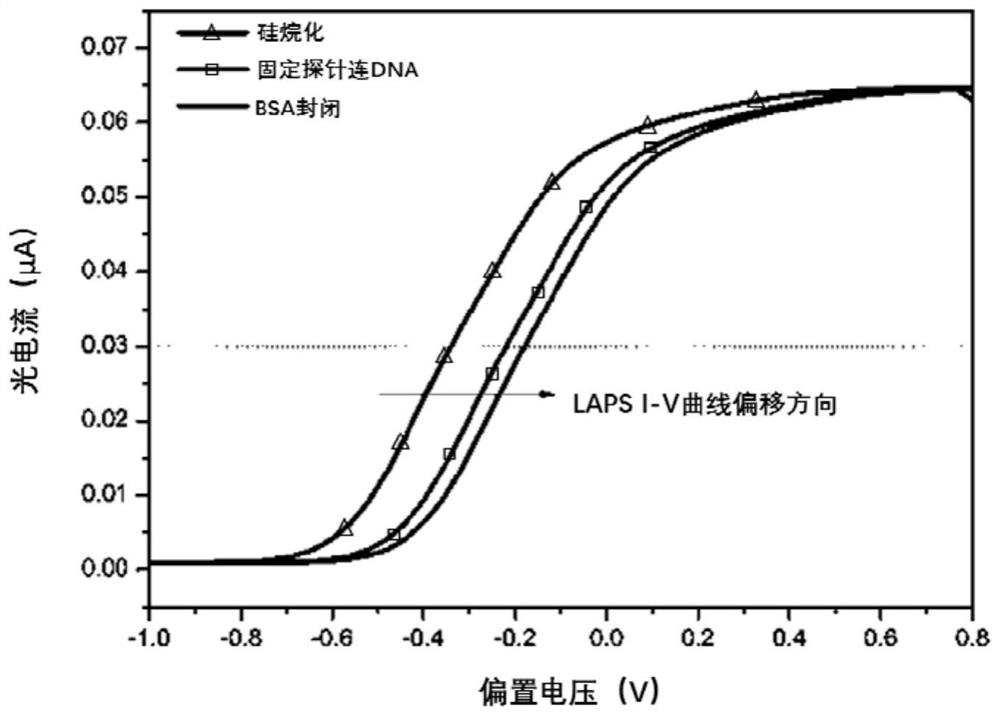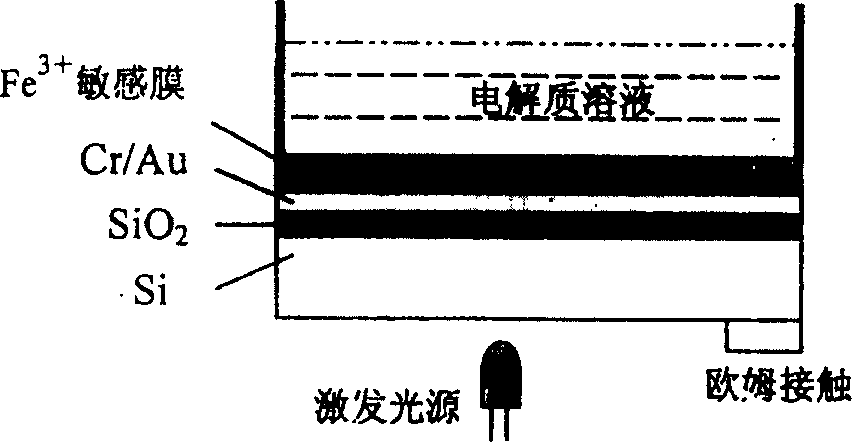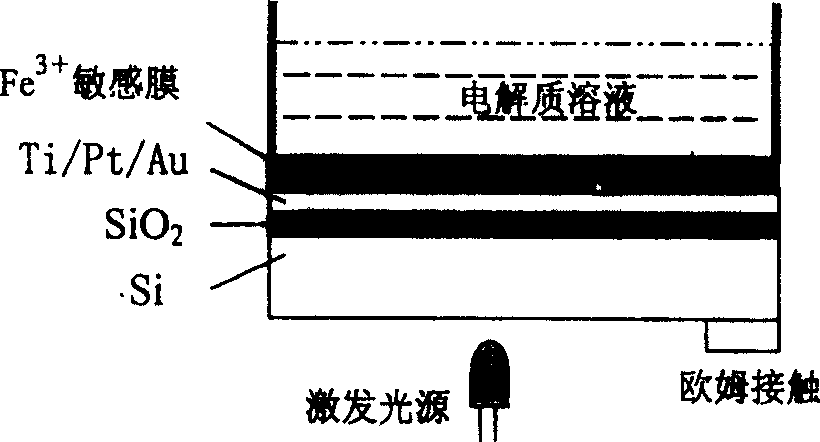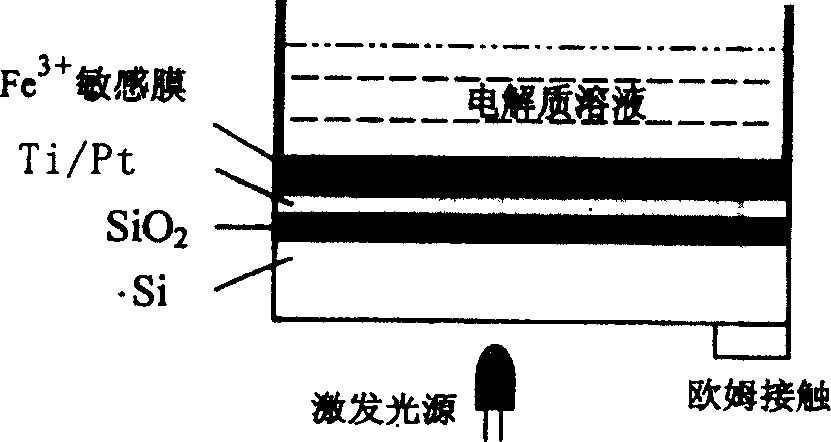Patents
Literature
Hiro is an intelligent assistant for R&D personnel, combined with Patent DNA, to facilitate innovative research.
34 results about "Light-addressable potentiometric sensor" patented technology
Efficacy Topic
Property
Owner
Technical Advancement
Application Domain
Technology Topic
Technology Field Word
Patent Country/Region
Patent Type
Patent Status
Application Year
Inventor
A light-addressable potentiometric sensor (LAPS) is a sensor that uses light (e.g. LEDs) to select what will be measured. Light can activate carriers in semiconductors.
Integrated analysis device for simultaneously detecting ebcs and vocs in human exhaled breath
The present invention discloses an integrated analysis device for simultaneously detecting exhaled breath condensates (EBCs) and volatile organic compounds (VOCs) in human exhaled breath. The device comprises a module for sampling, separating and enriching a detected object, an EBCs detection module and a combined VOCs detection module. The module for sampling, separating and enriching a detected object is connected with the EBCs detection module via a syringe pump for sample injection. The module for sampling, separating and enriching a detected object is connected with the combined VOCs detection module by a capillary separation column. In the present invention, it is achieved that EBCs and VOCs in human exhaled breath are simultaneously sampled, separated and condensed; the heavy metal ions, cell factors, etc. in the collected EBCs are detected with a light addressable potentiometric sensor (LAPS); the condensed VOCs can be quantitatively detected by the combined VOCs detection module with a high sensitivity; and a heating rod and a platinum resistor can be conveniently replaced because a separated outlet heating piece is designed in the combined VOCs detection module.
Owner:ZHEJIANG UNIV
Light addressing molecular imprinting array sensor for distinguishing residual pesticides
ActiveCN102103112AEasy to replaceEasy self-alignmentMaterial electrochemical variablesOrganic glassLight-emitting diode
The invention discloses a light addressing molecular imprinting array sensor for distinguishing residual pesticides, which is composed of a light addressing molecular imprinting array chip and a measuring cell of a light-addressable potentiometric sensor, wherein, the array chip based on a micro-electromechanical system (MEMS) technology is a silicon substrate microstructural array; a sol-gel molecular imprinting method is adopted on the surface of an array sensitive area of the chip to modify tetraethoxysilane, thus molecular imprinting sensitive membranes of various pesticides with the residues, such as organophosphorus, carbamic acid ester and the like can be distinguished; the measuring cell is made of organic glass, and comprises an upper cover, a measuring cell base and a seal rubber ring; the array chip can be arranged inside the measuring cell base interchangeably as a working electrode; an infrared light-emitting diode (LED) array is directly embedded outside the base by sealgum, and corresponds to the array chip; the inner side part corresponding to the working electrode array chip, of the upper cover is provided with a copper-based electroplate platinum (Pt) film as a counter electrode and an inlet and outlet pipeline; and the ring-shaped upper cover and the periphery of the measuring cell base are provided with screw threads, and the ring-shaped upper cover and themeasuring cell base are sealed into the measuring cell through the seal rubber ring.
Owner:INST OF ELECTRONICS CHINESE ACAD OF SCI
Full-automatic cell physiological parameter analyzer based on multi-parameter detection integrated chip
InactiveCN101705184AMeet the growth environment requirementsReduce consumptionBioreactor/fermenter combinationsBiological substance pretreatmentsMicroelectrodeEngineering
The invention discloses a full-automatic cell physiological parameter analyzer based on a multi-parameter detection integrated chip. The full-automatic cell physiological parameter analyzer comprises a sealed measurement cavity, wherein a chip interface device and a multi-parameter integrated chip component are internally arranged in the measurement cavity; the chip interface device comprises a base, a chip interface circuit board and a sealing cap which are sequentially and fixedly connected into a whole from bottom to top; a through-hole fitted with the multi-parameter integrated chip component is formed in the center of the sealing cap; a pressure gasket is connected above the through-hole of the sealing cap; a spring ejector pin is welded on the chip interface circuit board; the multi-parameter integrated chip component is arranged in the through-hole of the sealing cap and forms close contact among the pressure gasket, the multi-parameter integrated chip component and the spring ejector pin in sequence; a computer and a light-addressable potentiometric sensor (LAPS) detection circuit, an impedance detection circuit and a microelectrode array detection circuit of a measuring and controlling circuit are connected with a central controlling circuit respectively; and the LAPS detection circuit, the impedance detection circuit and the microelectrode array detection circuit are connected with the chip interface circuit board respectively.
Owner:ZHEJIANG UNIV
Film optical addressing electric potential sensor used for detecting Hg2+ and preparation method thereof
InactiveCN1547004AQuick measurementEasy to useMaterial analysis by electric/magnetic meansThin film sensorOptoelectronics
The invention discloses film light addressing potential sensor for measuring Hg2+ and the manufacturing method. The sensor is based on the light addressing potential sensor (LAPS), a layer of sensitive film is produced on its surface with laser pulse depositing technology. The invention synthesizes the sensitive material at first, which is used as the target of pulse laser deposition. Then it produces a fixed metal layer through magnetism control sputtering technology on LAPS, and then carries on the process of film with laser pulse depositing technology and device. The film sensor is sensitive to the Hg2+ in the liquid; it can detect the content of Hg2+.
Owner:ZHEJIANG UNIV
Light-assisted biochemical sensor
ActiveUS20120153407A1High sensitivityRelatively small errorSolid-state devicesSemiconductor devicesHysteresisEffect light
A light-assisted biochemical sensor based on a light addressable potentiometric sensor is disclosed. The light-assisted biochemical sensor comprises a semiconductor substrate and a sensing layer, which are used to detect the specific ion concentration or the biological substance concentration of a detected solution. Lighting elements fabricated directly on the back surface of the semiconductor substrate directly illuminate the light to the semiconductor substrate, so as to enhance the photoconduction property of the semiconductor substrate. And then, the hysteresis and the sensing sensitivity of the light-assisted biochemical sensor are respectively reduced and improved. In addition, due to its characteristics of integration, the light-assisted biochemical sensor not only reduces the fabrication cost but also has portable properties and real-time detectable properties. As a result, its detection range and the application range are wider.
Owner:CHANG GUNG UNIVERSITY
System and method for simultaneous detection of extracellular environmental toxicants and cell metabolism
InactiveCN102517203AQuick attachGrow fastBioreactor/fermenter combinationsBiological substance pretreatmentsToxicantPolyvinyl chloride
The invention discloses a system and method for simultaneous detection of extracellular environmental toxicants and cell metabolism. In the invention, a Zn<2+> chalcogenide glass sensitive membrane and a Cl<-> polyvinyl chloride sensitive membrane simultaneously deposit and combine on the surface of a light-addressable potentiometric sensor so as to form a Zn<2+> chalcogenide glass sensitive membrane-Cl<-> polyvinyl chloride sensitive membrane-light-addressable potentiometric sensor, which can quickly detect the Zn<2+> concentration of extracellular environmental toxicants and the Cl<-> ion concentration of cell metabolism at the same time, and infer the quantitative relationship between the two. A constructed micro-cavity can improve the sensitivity of ion concentration, and can ensure the consistency of detection conditions simultaneously, thus greatly reducing the part replacement cost and improving the service life of a sensor package unit. The above characteristics can meet the requirements for simultaneous detection of extracellular environmental toxicants and cellular metabolism, so that the system and method of the invention can be widely used in related fields of researchon heavy metal concentration and cell metabolism mechanism.
Owner:ZHEJIANG UNIV
Method for preparing sensitive membrane of TiO2 sol-gel molecular engram taste sense sensor
InactiveCN102253093AOptically transparentNo loss of light intensityMaterial electrochemical variablesResponse sensitivityOptical transparency
The invention relates to a method for preparing a sensitive membrane of a titanium dioxide sol-gel molecular engram taste sense sensor, which is suitable for a light addressable potentionmetric sensor (LAPS). The method comprises the following steps of: preparing titanium dioxide sol solution containing taste sense substances serving as template molecules by a hydrolytic process, dipping and coating the solution to a silicon wafer of which the structure is SiO2 / Si / Al, removing a template agent, and drying by nitrogen to obtain the gel sensitive membrane of the taste sense sensor with taste sense substance molecular engram. The taste sense sensitive membrane has the optical transparency, can ensure that an addressing light source penetrates through the sensitive membrane without losing light intensity, has different response sensitivities for different taste sense substances and has the interactive response performance; a structure of the sensitive membrane is stable in liquid phase environment, so the sensitive membrane has the long service life; and a manufacturing process is simple, and expensive and complex instruments are saved. The LAPS taste sense sensor containing the sensitive membrane can be used for the qualitative identification and quantitative determination of five basic taste sense substances including sour, sweet, bitter, salt taste and fresh taste.
Owner:GUILIN UNIV OF ELECTRONIC TECH
Film optical addressing electric potential sensor used for detecting Fe3+ and preparation method thereof
InactiveCN1547003ADetection device is smallLess interference ionsMaterial analysis by electric/magnetic meansThin film sensorOptoelectronics
The invention discloses film light addressing potential sensor for measuring Fe3+ and the manufacturing method. The sensor is based on the light addressing potential sensor (LAPS), a layer of sensitive film is produced on its surface with laser pulse depositing technology. The invention synthesizes the sensitive material at first, which is used as the target of pulse laser deposition. Then it produces a fixed metal layer through magnetism control sputtering technology on LAPS, and then carries on the process of film with laser pulse depositing technology and device. The film sensor is sensitive to the Fe3+ in the liquid; it can detect the content of Fe3+.
Owner:ZHEJIANG UNIV
An array type optical addressable potential sensor and its manufacturing method
InactiveCN102288655AReduce signal interferenceReduce crosstalk noiseMaterial electrochemical variablesSoi substrateOptoelectronics
The invention discloses an array-type light addressable potentiometric sensor comprising an SOI (Silicon-On-Insulator) substrate and a plurality of isolating islands formed on the SOI substrate, wherein the SOI substrate in the isolating islands is provided with light addressable potentiometric sensing units, a diffusion ring, a substrate electrode and an on-chip reference electrode. The invention further discloses a manufacturing method of the array-type light addressable potentiometric sensor, and the method comprises the steps of: (1) manufacturing the isolating islands; (2) manufacturing the diffusion ring; (3) manufacturing the light addressable potentiometric sensing units; (4) manufacturing the on-chip reference electrode; and (4) manufacturing the substrate electrode. According tothe invention, the degree of isolation between the light addressable potentiometric sensing units are effectively enhanced by adopting the SOI substrate in combination with the isolation channel groove, and the unique design of the on-chip reference electrode in the invention is more favorable for the microminiaturization and integration of the sensor.
Owner:ZHEJIANG UNIV
Integrated analysis device for simultaneously detecting EBCs and VOCs in human exhaled breath
The present embodiments disclose a device including a module for sampling, separating and enriching a detected object, an exhaled breath condensates (EBCs) detection module and a combined volatile organic compounds (VOCs) detection module. The sampling module is connected with the EBCs detection module via a syringe pump for sample injection and is connected with the combined VOCs detection module by a capillary separation column. EBCs and VOCs in human exhaled breath are simultaneously sampled, separated and condensed; the heavy metal ions, cell factors, etc. in the collected EBCs are detected with a light addressable potentiometric sensor (LAPS); the condensed VOCs can be quantitatively detected by the combined VOCs detection module with a high sensitivity; and a heating rod and a platinum resistor can be conveniently replaced because a separated outlet heating piece is designed in the combined VOCs detection module.
Owner:ZHEJIANG UNIV
Temperature self compensation method for LAPS (Light Addressable Potentiometric Sensor)
ActiveCN105300412AImprove detection accuracyReduces the effects of temperature cross-sensitivitySpecial purpose recording/indication apparatusSystem testingSelf compensation
The invention discloses a temperature self compensation method for a LAPS (Light Addressable Potentiometric Sensor). A corresponding relationship between the magnitude of saturated photocurrent outputted by the LAPS and environmental temperature is used, and through extracting the saturated photocurrent outputted by the LAPS, temperature self compensation is carried out on the LAPS. In a condition with variable temperature, the corresponding relationship between the magnitude of the saturated photocurrent outputted by the LAPS and the environmental temperature is determined, and a LAPS temperature-saturated photocurrent feature curve is made; and the magnitude of the saturated photocurrent is extracted from an experimental data sample to serve as an input characteristic quantity for the environmental temperature, and a LAPS temperature self compensation model is built through software algorithm. According to LAPS output, through the temperature self compensation fusion processing, temperature compensation is carried out according to the temperature characteristic quantity, and the measured parameter is accurately detected. An experimental result shows that the LAPS temperature self compensation can eliminate temperature influences, the LAPS system testing precision is improved, and the method can be used for pH value detection for a buffer solution.
Owner:GUILIN UNIV OF ELECTRONIC TECH
Light-assisted biochemical sensor
ActiveUS8901678B2High sensitivityRelatively small errorSolid-state devicesSemiconductor devicesHysteresisEffect light
A light-assisted biochemical sensor based on a light addressable potentiometric sensor is disclosed. The light-assisted biochemical sensor comprises a semiconductor substrate and a sensing layer, which are used to detect the specific ion concentration or the biological substance concentration of a detected solution. Lighting elements fabricated directly on the back surface of the semiconductor substrate directly illuminate the light to the semiconductor substrate, so as to enhance the photoconduction property of the semiconductor substrate. And then, the hysteresis and the sensing sensitivity of the light-assisted biochemical sensor are respectively reduced and improved. In addition, due to its characteristics of integration, the light-assisted biochemical sensor not only reduces the fabrication cost but also has portable properties and real-time detectable properties. As a result, its detection range and the application range are wider.
Owner:CHANG GUNG UNIVERSITY
Carbohydrate lactic acid bacteria metabolism analysis and detection device and method
ActiveCN111735867AReduce signal driftAccurately grasp the metabolic characteristics of lactic acid bacteriaMaterial electrochemical variablesLactic acid bacteriumLight excitation
The invention relates to a carbohydrate lactic acid bacteria metabolism analysis and detection device which comprises a controller, a signal circuit, a light source modulation circuit, an excitation light source, a light addressing potential sensor, a reference electrode and a test cavity, the light addressing potential sensor is fixed at the bottom of the test cavity and is connected with the signal circuit; one end of the reference electrode is inserted into the test cavity, and the other end is connected with the signal circuit to provide bias for the light addressable potential sensor; theexcitation light source is arranged on the back surface of the light addressing potential sensor, is connected with the light source modulation circuit and provides light excitation for the light addressing potential sensor; the light source modulation circuit is connected with the signal circuit and is controlled by the signal circuit to modulate optical excitation; and the controller is in communication connection with the signal circuit and is used for detecting, controlling, recording and processing acquired data. According to the invention, quantitative analysis and detection of carbohydrate lactic acid bacteria metabolism can be realized.
Owner:天津海星辉科技有限公司
Full-automatic cell physiological parameter analyzer based on multi-parameter detection integrated chip
InactiveCN101705184BMeet the growth environment requirementsReduce consumptionBioreactor/fermenter combinationsBiological substance pretreatmentsMicroelectrodeEngineering
The invention discloses a full-automatic cell physiological parameter analyzer based on a multi-parameter detection integrated chip. The full-automatic cell physiological parameter analyzer comprises a sealed measurement cavity, wherein a chip interface device and a multi-parameter integrated chip component are internally arranged in the measurement cavity; the chip interface device comprises a base, a chip interface circuit board and a sealing cap which are sequentially and fixedly connected into a whole from bottom to top; a through-hole fitted with the multi-parameter integrated chip component is formed in the center of the sealing cap; a pressure gasket is connected above the through-hole of the sealing cap; a spring ejector pin is welded on the chip interface circuit board; the multi-parameter integrated chip component is arranged in the through-hole of the sealing cap and forms close contact among the pressure gasket, the multi-parameter integrated chip component and the spring ejector pin in sequence; a computer and a light-addressable potentiometric sensor (LAPS) detection circuit, an impedance detection circuit and a microelectrode array detection circuit of a measuring and controlling circuit are connected with a central controlling circuit respectively; and the LAPS detection circuit, the impedance detection circuit and the microelectrode array detection circuit areconnected with the chip interface circuit board respectively.
Owner:ZHEJIANG UNIV
Measuring cell for light-addressable potentiometric sensor
ActiveCN102230912ASimple structureThe structure is a standard cuboid, and the manufacturing process is simpleMaterial analysis by electric/magnetic meansSquare arrayLight-addressable potentiometric sensor
The invention discloses a measuring cell for a light-addressable potentiometric sensor, comprising square arrays (6), circular holes (7) and square arrays (8), wherein the square arrays (6) are arranged with equal spacing on the top cover of the measuring cell (1); the square arrays (8) are arranged with equal spacing at the bottom of the measuring cell and juxtapose with and correspond to the square arrays on the top cover. As silicon chips are coated with different sensitive membranes, the measuring cell provided by the invention can be used to carry out multi-parameters and multi-point measurements on solutions, and also can be suitable for the concentration distribution measurement of a same solution in different measurement domains; the whole structure of the measuring cell is a standard cuboid and is simpler than that of the step counter method by the control of a stepping motor; the measuring cell is easy to integrate and operate with accurate addressing. The invention has solved the disadvantages of complicated peripheral control and manufacturing process, inconvenient operation and impossibility of accurate addressing in present measuring cells for light-addressable potentiometric sensors.
Owner:GUILIN UNIV OF ELECTRONIC TECH
Light-addressable potentiometric sensor for monitoring isolated mouse heart
InactiveCN101732046AGuaranteed mechanical strengthHigh sensitivityDiagnostic recording/measuringSensorsBiochemical engineeringLiquid tank
The invention discloses a light-addressable potentiometric sensor for monitoring an isolated mouse heart and use thereof in monitoring surface potential of the isolated mouse heart. The light-addressable potentiometric sensor comprises a reference electrode, a light source and a sensor chip, wherein the light source and the sensor chip are packaged in the cavity; a liquid tank is arranged in an upper cavity of the cavity; the bottom part of the liquid tank is provided with an insulating layer of the sensor chip; the reference electrode is placed in test liquid in the liquid tank; a first groove for holding the light source is arranged in a lower cavity of the cavity; a second groove is arranged the central positions of a working electrode and a substrate of the sensor chip and runs through the working electrode and the substrate; a measurement area of the substrate is arranged over the second groove; the second groove is communicated with the first groove; and the central axes of the liquid tank, the measurement area of the substrate, the second groove and the first groove are coincide. The light-addressable potentiometric sensor can be processed and packaged easily and effectively used for monitoring the isolated mouse heart.
Owner:ZHEJIANG UNIV
Genetically biotinylated recombinant antibody in immunofiltration assay by light addressable potentiometric sensor for identification of Venezuelan equine encephalitis virus
InactiveUS7309566B2Microbiological testing/measurementImmunoglobulins against virusesBiotin-streptavidin complexFiltration
A genetically biotinylated single chain fragment variable (scFv) antibody against Venezuelan equine encephalitis virus (VEE) being applied in a system consisting of an immunofiltration-enzyme assay (IFA) with a light addressable potentiometric sensor (LAPS) for the rapid identification of VEE is disclosed. The IFA entails formation of an immunocomplex sandwich consisting of VEE, biotinylated antibody, fluoresceinated antibody and streptavidin, capturing the sandwich by filtration on biotinylated membrane, and detecting the sandwich by anti-fluorescein urease conjugate. The concentration ratio of biotinylated to fluoresceinated antibodies is investigated and optimized. The IFA / LAPS assay sensitivity was approximately equal to that of a conventional enzyme-linked immunosorbant assay utilizing polystyrene plates and a chromogenic substrate, however, less time and effort were required for performance of the IFA / LAPS assay.
Owner:HER MAJESTY THE QUEEN AS REPRESENTED BY THE MINIST OF NAT DEFENCE OF HER MAJESTYS CANADIAN GOVERNMENT
Film optical addressing electric potential sensor used for detecting Hg2+ and preparation method thereof
InactiveCN1235044CQuick measurementEasy to useMaterial analysis by electric/magnetic meansThin film sensorOptoelectronics
The invention discloses film light addressing potential sensor for measuring Hg2+ and the manufacturing method. The sensor is based on the light addressing potential sensor (LAPS), a layer of sensitive film is produced on its surface with laser pulse depositing technology. The invention synthesizes the sensitive material at first, which is used as the target of pulse laser deposition. Then it produces a fixed metal layer through magnetism control sputtering technology on LAPS, and then carries on the process of film with laser pulse depositing technology and device. The film sensor is sensitive to the Hg2+ in the liquid; it can detect the content of Hg2+.
Owner:ZHEJIANG UNIV
Composite feedback light intensity modulation system of optical address potentiometric transducer
InactiveCN101929976AImprove long-term stabilityImprove temperature stabilityPhotometryMaterial electrochemical variablesLow distortionSuperradiance
The invention discloses a composite feedback light intensity modulation system of an optical address potentiometric transducer. A super-radiation light-emitting dioxide module of the modulation system comprises a super-radiation light-emitting dioxide, a refrigerator and a thermal resistor; a composite feedback light intensity modulation circuit comprises an amplifying and feedback circuit, a last level current amplifier and a tube core temperature detection and control circuit; an output end of the amplifying and feedback circuit is connected with an input end of the last level current amplifier; an output end of the last level current amplifier is connected with the supper-radiation light-emitting dioxide; the super-radiation light-emitting dioxide is connected with a first negative feedback interface of the amplifying and feedback circuit; the thermal resistor is connected with an input end of the tube core temperature detection and control circuit; an output end of the tube core temperature detection and control circuit is connected with the refrigerator; and the super-radiation light-emitting dioxide, the refrigerator and the thermal resistor are in thermal coupling with one another. The light intensity of the composite feedback light intensity modulation system changes along with voltage signals input from the outside proportionally, and has the advantages of low distortion characteristic, long-term stability and temperature stability.
Owner:ZHEJIANG UNIV
Heavy metal detection method based on aptamers-light addressable potentiometric sensors
InactiveCN106645317AAccurate judgmentPrecisely formulatedMaterial electrochemical variablesImage resolutionPhysical chemistry
The invention provides a heavy metal detection method based on aptamers-light addressable potentiometric sensors. According to the method, the light addressable potentiometric sensors arranged in arrays are taken as a substrate, different kinds of heavy metal ion aptamer probes are fixed on upper surfaces of the light addressable potentiometric sensors, so that high-sensitivity, high-reliability and high-resolution heavy metal ion detection of multiple kinds of heavy metal ions can be realized, and the problems that a traditional electrochemical mercury electrode is toxic, causes secondary pollution to the environment and the like can be solved.
Owner:NANKAI UNIV +2
Light addressing molecular imprinting array sensor for distinguishing residual pesticides
ActiveCN102103112BEasy to replaceEasy self-alignmentMaterial electrochemical variablesOrganic glassLight-emitting diode
The invention discloses a light addressing molecular imprinting array sensor for distinguishing residual pesticides, which is composed of a light addressing molecular imprinting array chip and a measuring cell of a light-addressable potentiometric sensor, wherein, the array chip based on a micro-electromechanical system (MEMS) technology is a silicon substrate microstructural array; a sol-gel molecular imprinting method is adopted on the surface of an array sensitive area of the chip to modify tetraethoxysilane, thus molecular imprinting sensitive membranes of various pesticides with the residues, such as organophosphorus, carbamic acid ester and the like can be distinguished; the measuring cell is made of organic glass, and comprises an upper cover, a measuring cell base and a seal rubber ring; the array chip can be arranged inside the measuring cell base interchangeably as a working electrode; an infrared light-emitting diode (LED) array is directly embedded outside the base by sealgum, and corresponds to the array chip; the inner side part corresponding to the working electrode array chip, of the upper cover is provided with a copper-based electroplate platinum (Pt) film as a counter electrode and an inlet and outlet pipeline; and the ring-shaped upper cover and the periphery of the measuring cell base are provided with screw threads, and the ring-shaped upper cover and themeasuring cell base are sealed into the measuring cell through the seal rubber ring.
Owner:INST OF ELECTRONICS CHINESE ACAD OF SCI
Metabolic analysis and detection device and method of sugar lactic acid bacteria
ActiveCN111735867BReduce signal driftAccurately grasp the metabolic characteristics of lactic acid bacteriaMaterial electrochemical variablesLactic acid bacteriumLight excitation
The invention relates to a carbohydrate lactic acid bacteria metabolism analysis and detection device which comprises a controller, a signal circuit, a light source modulation circuit, an excitation light source, a light addressing potential sensor, a reference electrode and a test cavity, the light addressing potential sensor is fixed at the bottom of the test cavity and is connected with the signal circuit; one end of the reference electrode is inserted into the test cavity, and the other end is connected with the signal circuit to provide bias for the light addressable potential sensor; theexcitation light source is arranged on the back surface of the light addressing potential sensor, is connected with the light source modulation circuit and provides light excitation for the light addressing potential sensor; the light source modulation circuit is connected with the signal circuit and is controlled by the signal circuit to modulate optical excitation; and the controller is in communication connection with the signal circuit and is used for detecting, controlling, recording and processing acquired data. According to the invention, quantitative analysis and detection of carbohydrate lactic acid bacteria metabolism can be realized.
Owner:天津海星辉科技有限公司
Arrayed optical address electric potential sensor chip and its manufacture method
The invention discloses an array optical address potential sensor chip and preparation method thereof. The array optical address potential sensor chip comprises silicone base chip and a plurality of sensitive zones are provided on the front face of the silicone base chip and a front face heavily doped layer is provided on the silicone base chip around the sensitive zones. An oxide layer is mounted above the sensitive zones and the front face heavily doped layer. A chip electrode is set on the thick oxide layer above the front face heavily doped layer. A back face heavily doped layer is set onthe back face of the silicone base chip and an aluminium electrode is set on the back face of the heavily doped layer. The silicone base chip between the sensitive zones is heavily doped and the thick oxide layer grows on the heavily doped layer and the chip electrode is set on the thick oxide layer. The chip can increase the degree of freedom of the coating sensitive membrane and the chip electrode can directly be connected with the external circuit to measure without other electrode. The back face heavily doped layer can form good ohmic contact with the aluminium electrode and silicone basechip. The preparation method uses standard semiconductor technology to ensure the consistency of the chip performance.
Owner:ZHEJIANG UNIV
A Measuring Cell for Optically Addressable Potential Sensors
ActiveCN102230912BSimple structureSimple preparation processMaterial analysis by electric/magnetic meansSquare arrayMeasurement point
The invention discloses a measuring pool for an optical addressing potential sensor, which is composed of a square array (6), a round hole (7) and a square array (8), and the square arrays (6) are arranged at equal intervals on the top of the measuring pool (1) On the cover, the square arrays (8) are arranged at the bottom of the measuring pool at equal intervals, and are aligned up and down with the square arrays on the top cover, in one-to-one correspondence; the solution can be multi-parameterized and multi-parameterized by coating different sensitive films on the silicon wafer. Point measurement can also be applied to the measurement of the concentration distribution of the same solution component in different measurement domains. The overall structure is a standard cuboid, which is simpler in structure than the method of controlling the number of steps of the stepping motor, accurate in addressing, easy to integrate, and easy to operate. The invention solves the disadvantages of complicated peripheral control and manufacturing process, cumbersome operation and inaccurate addressing in the existing optical addressing sensor measuring pool.
Owner:GUILIN UNIV OF ELECTRONIC TECH
Composite feedback light intensity modulation system of optical address potentiometric transducer
InactiveCN101929976BImprove long-term stabilityImprove temperature stabilityMaterial electrochemical variablesLow distortionSuperradiance
The invention discloses a composite feedback light intensity modulation system of an optical address potentiometric transducer. A super-radiation light-emitting dioxide module of the modulation system comprises a super-radiation light-emitting dioxide, a refrigerator and a thermal resistor; a composite feedback light intensity modulation circuit comprises an amplifying and feedback circuit, a last level current amplifier and a tube core temperature detection and control circuit; an output end of the amplifying and feedback circuit is connected with an input end of the last level current amplifier; an output end of the last level current amplifier is connected with the supper-radiation light-emitting dioxide; the super-radiation light-emitting dioxide is connected with a first negative feedback interface of the amplifying and feedback circuit; the thermal resistor is connected with an input end of the tube core temperature detection and control circuit; an output end of the tube core temperature detection and control circuit is connected with the refrigerator; and the super-radiation light-emitting dioxide, the refrigerator and the thermal resistor are in thermal coupling with one another. The light intensity of the composite feedback light intensity modulation system changes along with voltage signals input from the outside proportionally, and has the advantages of low distortion characteristic, long-term stability and temperature stability.
Owner:ZHEJIANG UNIV
System and method for simultaneous detection of extracellular environmental toxicants and cell metabolism
InactiveCN102517203BQuick attachGrow fastBioreactor/fermenter combinationsBiological substance pretreatmentsToxicantPolyvinyl chloride
The invention discloses a system and method for simultaneous detection of extracellular environmental toxicants and cell metabolism. In the invention, a Zn<2+> chalcogenide glass sensitive membrane and a Cl<-> polyvinyl chloride sensitive membrane simultaneously deposit and combine on the surface of a light-addressable potentiometric sensor so as to form a Zn<2+> chalcogenide glass sensitive membrane-Cl<-> polyvinyl chloride sensitive membrane-light-addressable potentiometric sensor, which can quickly detect the Zn<2+> concentration of extracellular environmental toxicants and the Cl<-> ion concentration of cell metabolism at the same time, and infer the quantitative relationship between the two. A constructed micro-cavity can improve the sensitivity of ion concentration, and can ensure the consistency of detection conditions simultaneously, thus greatly reducing the part replacement cost and improving the service life of a sensor package unit. The above characteristics can meet the requirements for simultaneous detection of extracellular environmental toxicants and cellular metabolism, so that the system and method of the invention can be widely used in related fields of researchon heavy metal concentration and cell metabolism mechanism.
Owner:ZHEJIANG UNIV
Differential type optical addressing potential sensor
ActiveCN110715964AHigh precisionAvoid influenceMaterial electrochemical variablesMetallic electrodeDevice material
The invention discloses a differential type optical addressing potential sensor. The differential type optical addressing potential sensor is characterized in that a semiconductor device is used as areference sub-sensor, and the cross-section structure of the semiconductor device is a five-layer structure of a metal electrode, a sensitive layer, a transition layer, a semiconductor layer and an output electrode. A reference solution does not need to be added into the reference sub-sensor during measurement, so that the measurement step is simplified; the reference sub-sensor and a measurementsub-sensor are arranged on silicon wafers which are not connected with each other, so that the replacement of the differential type optical addressing potential sensor is facilitated; the reference sub-sensor is controlled by superposition of bias voltage and reference voltage, output photocurrent is prevented from being influenced by external factors, and the accuracy of the differential type optical addressing potential sensor is improved.
Owner:NORTHWESTERN POLYTECHNICAL UNIV
A device and method for improving the DNA detection performance of an optical addressable potential sensor using zno nanorods
Owner:XI AN JIAOTONG UNIV
Film optical addressing electric potential sensor used for detecting Fe3+ and preparation method thereof
InactiveCN1242259CDetection device is smallLess interference ionsMaterial analysis by electric/magnetic meansThin film sensorOptoelectronics
The invention discloses film light addressing potential sensor for measuring Fe3+ and the manufacturing method. The sensor is based on the light addressing potential sensor (LAPS), a layer of sensitive film is produced on its surface with laser pulse depositing technology. The invention synthesizes the sensitive material at first, which is used as the target of pulse laser deposition. Then it produces a fixed metal layer through magnetism control sputtering technology on LAPS, and then carries on the process of film with laser pulse depositing technology and device. The film sensor is sensitive to the Fe3+ in the liquid; it can detect the content of Fe3+.
Owner:ZHEJIANG UNIV
Array-type light addressable potentiometric sensor and manufacturing method thereof
InactiveCN102288655BReduce signal interferenceReduce crosstalk noiseMaterial electrochemical variablesEngineeringSoi substrate
The invention discloses an array-type light addressable potentiometric sensor comprising an SOI (Silicon-On-Insulator) substrate and a plurality of isolating islands formed on the SOI substrate, wherein the SOI substrate in the isolating islands is provided with light addressable potentiometric sensing units, a diffusion ring, a substrate electrode and an on-chip reference electrode. The invention further discloses a manufacturing method of the array-type light addressable potentiometric sensor, and the method comprises the steps of: (1) manufacturing the isolating islands; (2) manufacturing the diffusion ring; (3) manufacturing the light addressable potentiometric sensing units; (4) manufacturing the on-chip reference electrode; and (4) manufacturing the substrate electrode. According tothe invention, the degree of isolation between the light addressable potentiometric sensing units are effectively enhanced by adopting the SOI substrate in combination with the isolation channel groove, and the unique design of the on-chip reference electrode in the invention is more favorable for the microminiaturization and integration of the sensor.
Owner:ZHEJIANG UNIV
Features
- R&D
- Intellectual Property
- Life Sciences
- Materials
- Tech Scout
Why Patsnap Eureka
- Unparalleled Data Quality
- Higher Quality Content
- 60% Fewer Hallucinations
Social media
Patsnap Eureka Blog
Learn More Browse by: Latest US Patents, China's latest patents, Technical Efficacy Thesaurus, Application Domain, Technology Topic, Popular Technical Reports.
© 2025 PatSnap. All rights reserved.Legal|Privacy policy|Modern Slavery Act Transparency Statement|Sitemap|About US| Contact US: help@patsnap.com
